GPS Basketball Premiership




First in TGS history!













This semester has seen our community come together at multiple events and activities, from the Junior School’s Grandparents’ Day to the boarder parents’ appreciation function, to the Year 12’s final assembly.
These joyous occasions remind us that the TGS community is built upon a strong foundation of connection and belonging. It is these connections that our boys form with members of our School community that contribute so positively to the development of their character.
Few would argue that the development of a child’s character begins, first and foremost, in the home. Parents play an essential role in shaping their child’s character and most parents also want other adults to contribute to this education. In addition to this, and over time, intentional character education seems to have become an essential element of school curriculums.
The development of a child’s character is a process that occurs with contributions from individuals, organisations, societies and particularly schools. This is no surprise given that schools are formative environments in which children are educated.
As Headmaster, I think a great deal about the knowledge and skills that I would like Grammar boys to have when they leave. There is no doubt that we do all that we can to ensure the boys have the knowledge and skills to embrace the world of work and their future careers. We also want them to be independent, be able to cooperate
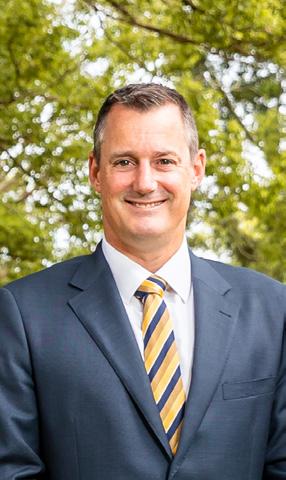
and learn with others, to be resilient and able to respond to challenges.
At the same time, we also want them to have a sense of self-worth and an assured knowledge of who they are, and how to function as an individual. This means being a decent human being and a good citizen. Someone who is compassionate, shows empathy, tolerance and a fundamental respect of women and diversity.
If we can help our boys understand the virtues associated with common morality, they will have a greater understanding about what is ethically important in situations and how to act for the right reasons. It is for this reason that character development in schools is important. Schools essentially prioritise character development and intentional approaches to this outcome provide significant benefits to the students.
In a complex and dynamic world, where circumstances change and agility is important, it is essential that students are equipped with the skills to flourish. To flourish does not necessarily mean being happy but rather it means to fulfil ‘one’s potential’, and this is an important aim of education. To achieve this requires the acquisition of virtue, and an understanding of excellence specific to domains of human endeavour. These traits are required for one to sustain a well-rounded life and to contribute to the society in which they live. Therefore, it is important for schools to play a role in the development of character through character education which includes, according to the Jubilee Centre for Character and Virtue (2022), “all explicit and implicit
educational activities that help young people to develop positive strengths called virtues.”
Character provides the foundations, along with their learning, that prepare boys for the world ahead, and to be good men. Of course, the success of a school is not easily identified and often not until well after a student has left school – when TGS Old Boys are 25, 30, 35. But we believe that a well-rounded and balanced child is better prepared for the world ahead, particularly if they have the skills to adapt to changing circumstances.
As our Year 12 students journey into the next phase of life, I wish to congratulate each of the boys on a rewarding year. No matter what their pathway is after school, we can ask nothing more of a boy who has given their very best. Thanks must also go to our Year 12 parents, your support for the boys in their final year of school has been significant and the partnerships you have formed with our staff to guide the boys has been invaluable.
I wish all members of the TGS community a safe and restful holiday period and I look forward to welcoming you all in 2023.
Yours sincerely, Dr John C. Kinniburgh
Headmaster

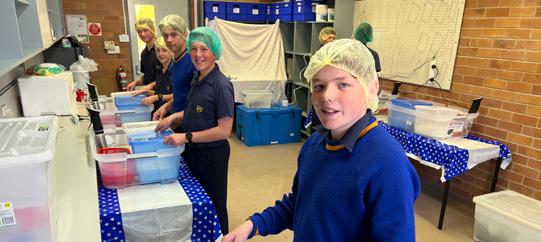




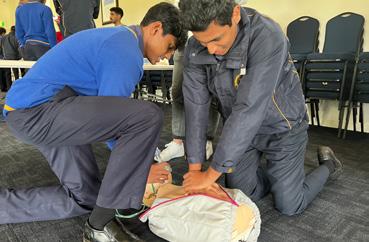
 Sam Schwennesen, Hamish McCollum, Seb Saint, Nihar Katuri and Nick Stone compete at the Rubik’s Cube Competition
Rubik’s Cube Competition crowd
Rugby 1st XV captain Charlie Horn is lifted in celebration of the Grammar Downlands win
Year 7 & 8 Maths Team Front (L–R): Alex Vanzella, Akshaj Kumar, Artharsh Gajaharan Middle (L–R): Praj Gupte, Charlie Parrington, Taj Khan, Abdullah Shahbaz Back (L–R): Banjo Seaniger, Mark Qin
Year 9 cheese making in Agricultural Studies
Indigenous Family Dinner (L–R): Chace Oates, Brady Forde, Jemimah Forde, Reid Hadfield, Barrett Hadfield, Pierce Hadfield, Kristian Rose and Chris Hadfield
Alex Vanzella - Orienteering
Year 10 & 11 students at the TROHPIQ Health Careers Workshop
Sam Schwennesen, Hamish McCollum, Seb Saint, Nihar Katuri and Nick Stone compete at the Rubik’s Cube Competition
Rubik’s Cube Competition crowd
Rugby 1st XV captain Charlie Horn is lifted in celebration of the Grammar Downlands win
Year 7 & 8 Maths Team Front (L–R): Alex Vanzella, Akshaj Kumar, Artharsh Gajaharan Middle (L–R): Praj Gupte, Charlie Parrington, Taj Khan, Abdullah Shahbaz Back (L–R): Banjo Seaniger, Mark Qin
Year 9 cheese making in Agricultural Studies
Indigenous Family Dinner (L–R): Chace Oates, Brady Forde, Jemimah Forde, Reid Hadfield, Barrett Hadfield, Pierce Hadfield, Kristian Rose and Chris Hadfield
Alex Vanzella - Orienteering
Year 10 & 11 students at the TROHPIQ Health Careers Workshop
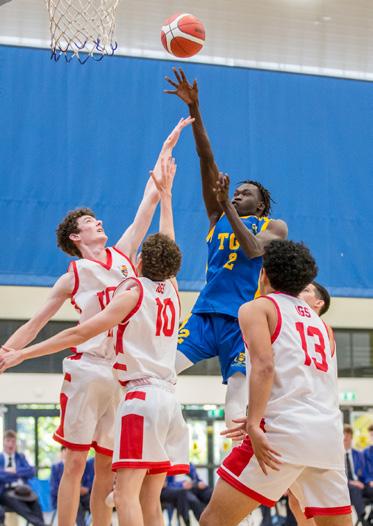

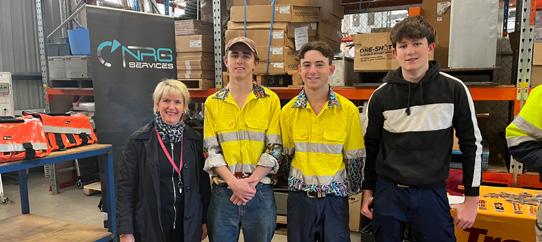

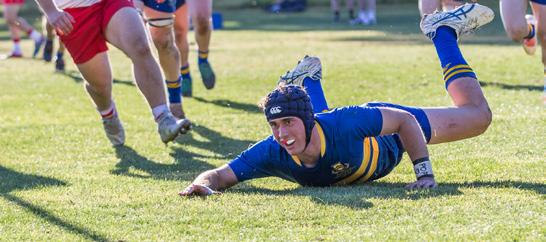



 Basketball 1st V’s Samuel Geu rises up over IGS defenders
Basketball 1st V’s James Nugent driving his way to the hoop
Basketball Presentation Special Award winners
(L–R): Rufaro Zimbwa, Rahul Captain, Samuel Geu, Tawana Ngorima
Year 11 student Chase Oates touches down for a try between the posts
Year 10s at the TSBE Manufacturing Showcase met representatives from Boeing and RME and TSBE CEO Ali Davenport
(L–R): Cale Maurice, Tom Bailey, Frank Reardon
Year 12 cohort photo
Mrs Marian Rathie with Nick Saal, Giles Birchley and Jim MacDonald who undergo their Certificate II in Electrotechnology at NRG Electrical Services
Year 10 students studying Japanese prepare Bento Boxes
Basketball 1st V’s Samuel Geu rises up over IGS defenders
Basketball 1st V’s James Nugent driving his way to the hoop
Basketball Presentation Special Award winners
(L–R): Rufaro Zimbwa, Rahul Captain, Samuel Geu, Tawana Ngorima
Year 11 student Chase Oates touches down for a try between the posts
Year 10s at the TSBE Manufacturing Showcase met representatives from Boeing and RME and TSBE CEO Ali Davenport
(L–R): Cale Maurice, Tom Bailey, Frank Reardon
Year 12 cohort photo
Mrs Marian Rathie with Nick Saal, Giles Birchley and Jim MacDonald who undergo their Certificate II in Electrotechnology at NRG Electrical Services
Year 10 students studying Japanese prepare Bento Boxes

The goal of the Toowoomba Grammar School Strategic Plan’s People Pillar is to “build a high-performing culture that supports the wellbeing and development of staff, who exemplify the TGS values and share our commitment to the growth of our boys”.
Our strategies to support this goal include:
» attracting and selecting the best workforce;
» developing and retaining the best staff;
» driving performance through leadership, culture and values;
» promoting a culture of wellbeing and safety; and
» maintaining operational HR excellence.
As a HR professional, my people and culture practices focus on the employee experience. I believe that if an organisation provides its staff with an employee experience that supports them to achieve their personal and professional best, they will be successful in their jobs and promote the School as a great place to work.
Employees are a touch point in an organisation’s interactions with its customers and in our environment, our customers are our boys, their parents and carers and the wider community. Our employees have the
ability to be great brand advocates and a strategic approach to employee experience is key. A strategic approach to the employee experience breaks down barriers between the School, its employees, and its customers. Positive employee experiences lead to employee engagement, consistency with the employer value proposition and employer brand, and business results.
The TGS People vision is to be the school that teachers and operational and support staff desire to be a part of; and that existing staff are fueled by pride, job satisfaction, and personal and professional growth. They understand how they personally contribute to the education of our boys, and they passionately drive an outstanding experience for our students and parents; while future staff recognise TGS as a leader in boys’ education and an irresistible environment in which to work.
Working towards this vision, this year the TGS staff participated in activities to workshop their desired culture and identify core values and behaviours that they consider to be essential to the success of the School and achieving of our vision. The desired values and behaviours will underpin our ability to create a culture that is most likely to enable our success as a team; enable individuals, teams and students to thrive; and enable achievement of our vision and strategic objectives. Together, staff members have identified the values of aspiration, kindness, collaboration, respect, integrity and accountability as those that most closely represent how we will work together to build our culture.
Scan to learn more about Staff Excellence at TGS
Ms Louise Strachan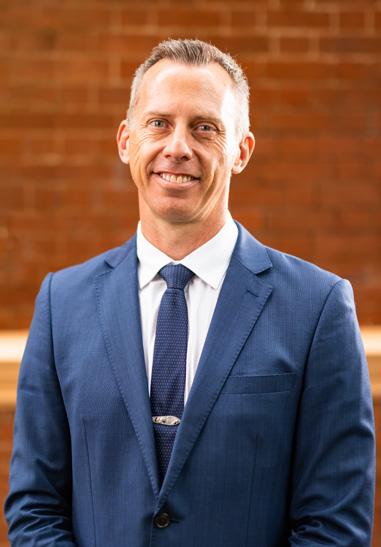
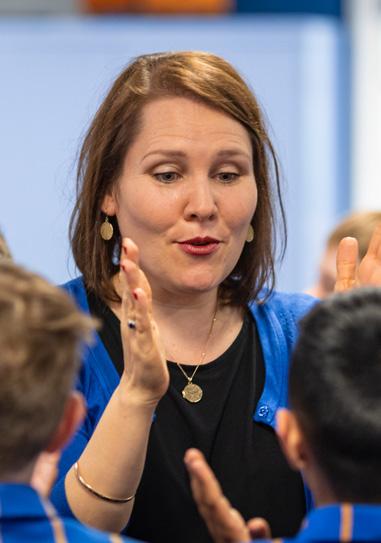


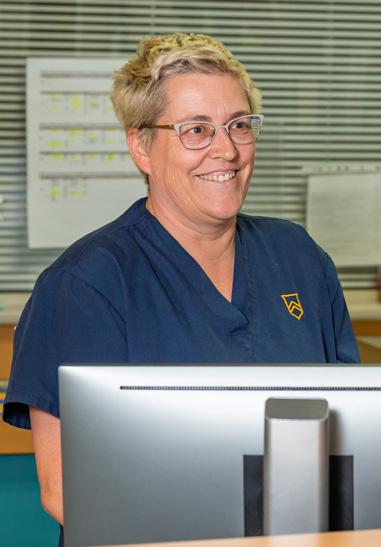
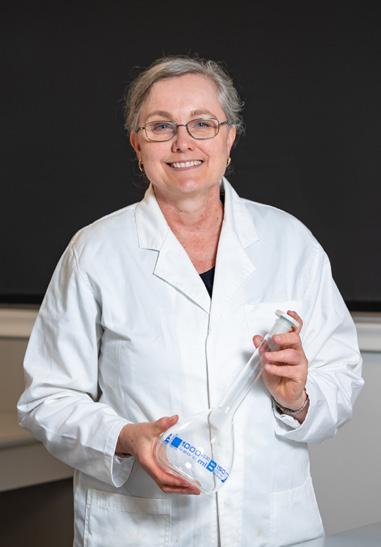
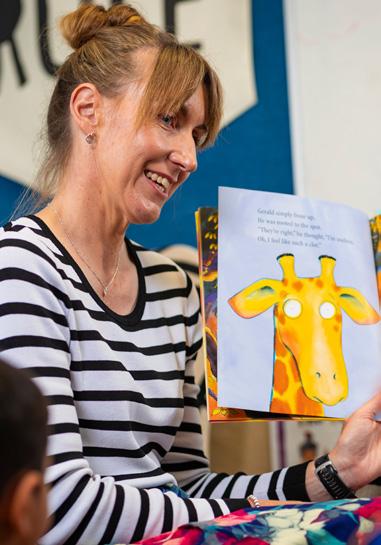

 Mrs Stacey Silver, Marketing & Digital Media Officer
Mrs Amelia Grills, Prep Teacher
Mrs Sharon Morgan, Health Centre Coordinator
Mr Michael Hall, Head of House - Boyce Boarding
Mrs Kellie Dixon, Head of Junior School Music
Mr Jamie Lee, Junior School Teacher
Mrs Linda Adamson, Laboratory Technician
Mr Mike Sharpe, Deputy Head of Junior School
Mrs Stacey Silver, Marketing & Digital Media Officer
Mrs Amelia Grills, Prep Teacher
Mrs Sharon Morgan, Health Centre Coordinator
Mr Michael Hall, Head of House - Boyce Boarding
Mrs Kellie Dixon, Head of Junior School Music
Mr Jamie Lee, Junior School Teacher
Mrs Linda Adamson, Laboratory Technician
Mr Mike Sharpe, Deputy Head of Junior School
Studies have shown that children between the ages of six to 12 actively learn on a device between two to three times a week. That does not include the time spent on a device where children learn through guided teaching.
Toowoomba Grammar School staff are highly proficient in helping guide our boys to use their time on devices in a structured, monitored, and effective way. Screen time has increased during COVID, and students spending more time on a device could be detrimental to their overall learning if not used effectively.
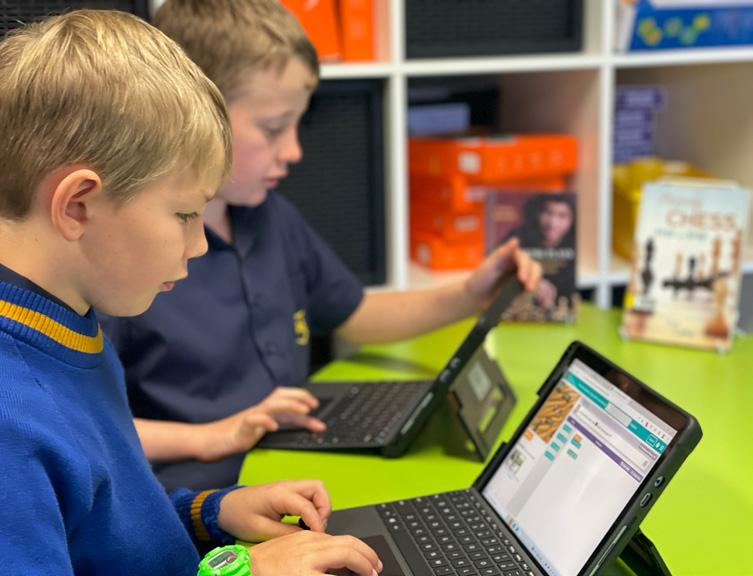
To combat this, TGS has a multitude of educational subscriptions to help extend the children’s learning, both inside and beyond the classroom. This allows for a scaffolded learning structure where lessons taught in class can be effectively followed up directly afterwards or at home. Teachers can also assess students’ prior knowledge based on practical tests to see the
child’s comprehension level before they embark on the lesson. Teachers can track each student’s progress while still monitoring the whole class. These tools are also immensely effective in collaborative teaching between different classes and school grades.
It is not just paid tools that are effective for learning. A student with the independent ability to selfresearch topics of interest can open a doorway to creativity and broad thinking. Explicit classroom teaching can be complemented by a student’s self-learning. For example, learning about the different lifecycles of animals can be enhanced through active research once a boy has received initial instruction in the classroom. Students
can document their investigations through Teams or OneNote and upload their work for the teacher to view. Then, students can have their work printed out to present as their own creation, cementing their understanding of the topic. Being able to task the children quizzes through Kahoot is another fun and effective assessment method for the whole class, built on the boys’ drive and competitive spirit.
TGS offers learning experiences even outside the classroom. The Junior School provides an afternoon club that teaches basic coding through to robotic-based activities. This course caters for different levels (Prep to Year 6) at different times of the year. The children see it as a fun afternoon playing on the computer or with toys connected to their laptops. However, being able to drag and drop code is a fundamental skill needed for future coding. The children can share skills while supporting and further growing their own abilities and knowledge.
Facilitating all these forms of learning is a key goal of the TGS Strategic Plan, “Adopt technology and innovative pedagogy to transform learning outcomes.” We hope to mould effective learners who will easily adapt to Senior School education and the transition to the workplace. We know we are preparing students for jobs that have not yet been created!
Zackaidyn Fleming and Henry Giesemann making the most of digital devicesBeing a kind person is fundamental to the growth of a successful person. Adults in our young men’s lives have a responsibility to model and teach the importance of respect, accepting and acknowledging our need to contribute to society in a positive and meaningful way.
In 2016, the Junior School staff felt there was a need to create a program that allowed us to develop the character of the boys in the Junior School. Tailoring a program to meet our boys’ needs rather than a generic one allows staff to change the program as required. After many hours of brainstorming relevant virtues which would help our boys learn to behave as fine young men, we developed the acronym REACH (Respect, Engagement, Awareness, Communication and Humility).
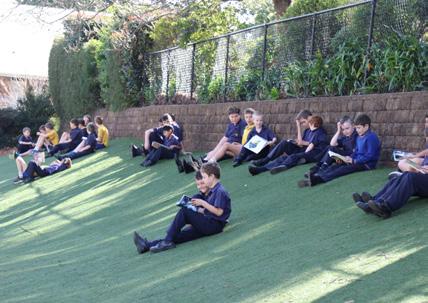

Staff feel that children appreciate the safe environment that occurs when they learn about respect, honesty, and compassion alongside their peers. The development of character enhances the boys’ learning in the classroom as they begin to exhibit virtues like patience, diligence, and self-control. Through regular discussions and activities in whole school, classroom, small group and one-on-one environments, students develop their understanding of what is required of them and others when functioning in society.
The teaching and understanding of the five attributes of REACH are different according to the age of the students. A student who starts in Prep will build on
this understanding throughout their time in the Junior School whilst older students model to younger students how particular behaviours look in the classroom, playground, performance and sporting fields.
For example, Hugo in Prep explains ‘Respect is when you look at the person who is speaking’. Charlie in Year 6 feels ‘Respect is generally when boys show good manners like waiting for teachers to finish conversations before speaking with them’.
Each fortnight the staff acknowledges and recognises students who have been demonstrating characteristics of one of the REACH attributes at the weekly assembly by way of a certificate and book voucher. We know that this development of character will help shape our young boys into fine young men.
Scan to learn more about Junior School Care & Wellbeing at TGS
 Charlie Pollock, David Kim, John Miller and Mrs Jessica Galbraith
Ayaansh Bhardwaj and Frank Laughlin
Junior School boys enjoying DEAR
Charlie Pollock, David Kim, John Miller and Mrs Jessica Galbraith
Ayaansh Bhardwaj and Frank Laughlin
Junior School boys enjoying DEAR
Musicians’ Cup Winners (L-R): 1st – Riley Burke (trumpet), 2nd – Lucas Wen (bass clarinet) and 3rd – Archie Luscombe (clarinet)


Jazz Band with their conductor Mr Chalmers, and their 1st place trophy from the Eisteddfod
Front Row (L-R): Aariz Imam, Hamish Lunn, Tom Williamson and Smith Waring
Middle Row (L-R): Riley Burke, Harry Johanson, Amza Fleming, Joseph Fernando, Will Bierhoff

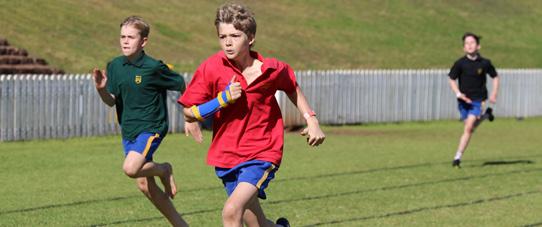
Back Row (L-R): Darcy Keating, Hamish Brown, Mr Mark Chalmers, Charlie Mowbray and Benji Gentry
Musicians’ Cup participants 2022
Front Row (L-R): Joseph Fernando, Riley Burke, Ethan Shepherd, Avaneesh Pai, Tom Williamson, Liam Galappaththi and Ruhan Bulchandani
Middle Row (L-R): Lucas Wen, Jake Decker, Amza Fleming, Smith Waring, Hamish Lunn and Aman Rao
Back Row (L-R): Darcy Keating, Archie Luscombe, Iskcon Gyawali, Jai Karki, Jack Elmes, Charlie Mowbray and Luke Beddoes
Concert Band with their conductor Mrs Dixon, and their 1st place trophy and Aggregate trophy from the Eisteddfod

Front row (L-R): Harry Johanson, Riley Burke, Ruhan Bulchandani, Hamish Lunn, Tom Williamson, Charlie Lunn, Smith Waring, Red Hamilton, Baxter Stirling and Suhaan Chowdhury
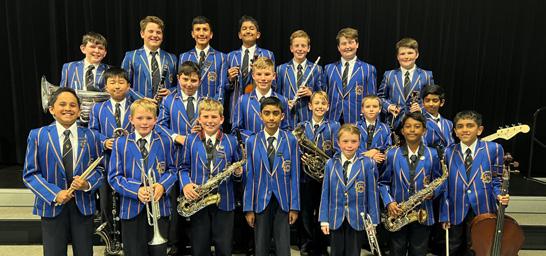

Middle Row (L-R): Arick Sengaroun, Aariz Imam, Charlie Pollock, Lucas Wen, Amza Fleming, Joseph Fernando, Edward Boland, Max Lynam, Harry Constable and Frank Loughlin
Back Row (L-R): Jake Decker, Benji Gentry, Darcy Keating, Harvey Barden, Jack Elmes, Charlie Mowbray, Archie Luscombe, Tom Oliphant, Will Bierhoff, Xinran Liang, Dominic Alexander and Mrs Kellie Dixon
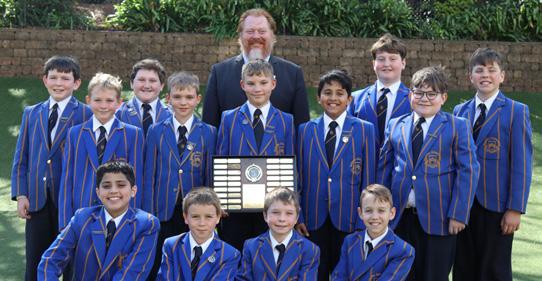 Harvey Bardon (L), Cooper Brennan (R) and Chayse Collis sprinting for the finish line
Junior School Track and Field Champions and Runners Up
Back Row (L-R): Liam Fels, Connor Talbot, Paddy Sander, Liam Galappaththi, Artie Hudson, Cody Fitzgerald, Cooper Selby and Bryce Krause.
Front Row (L-R): Max Beresford, Francis Fu, Marsden Lucas, Ayaamsj Bhardwaj, Jimmy Dewar, Peter Donovan, Blake Fryer and Harry Allen
Connor Talbot clearing the high bar
Harvey Bardon (L), Cooper Brennan (R) and Chayse Collis sprinting for the finish line
Junior School Track and Field Champions and Runners Up
Back Row (L-R): Liam Fels, Connor Talbot, Paddy Sander, Liam Galappaththi, Artie Hudson, Cody Fitzgerald, Cooper Selby and Bryce Krause.
Front Row (L-R): Max Beresford, Francis Fu, Marsden Lucas, Ayaamsj Bhardwaj, Jimmy Dewar, Peter Donovan, Blake Fryer and Harry Allen
Connor Talbot clearing the high bar


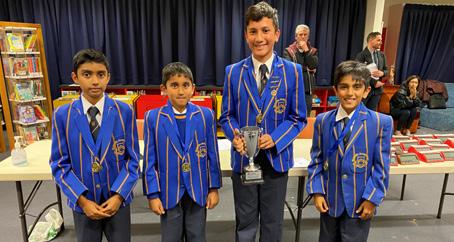

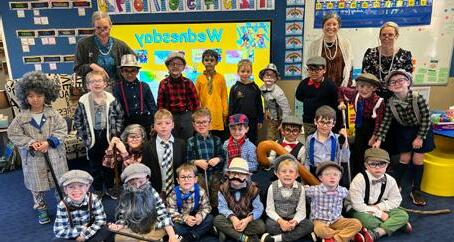


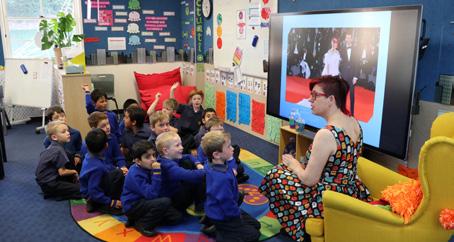
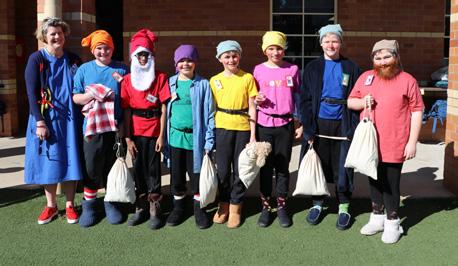
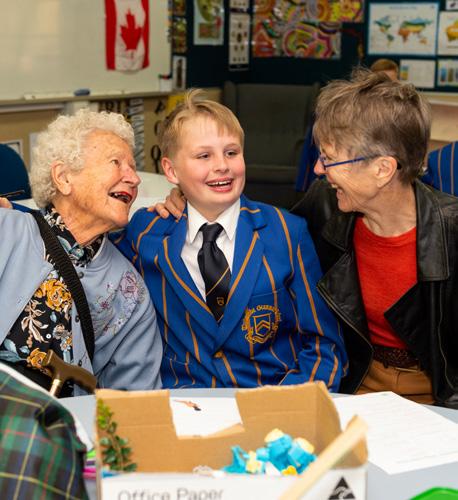
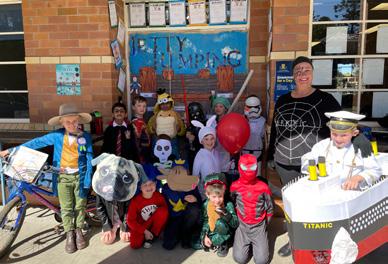 Snow White and the Seven Dwarfs put in an appearance to the Book Week dress up day. Mrs Worthington had fun dressing up with the Year 6 boys
Visiting author, Yvonne Mes captivated the Year 1 boys
Prep boys performed a vocal piece at the Junior School Grandparents’ Day Concert
Under 5 to Under 8 Swimming Champions and Runners Up (L-R): Darcy Hall, Francis Fu, Hank Lee, Flynn Loch, Conall Moar, Charlie Dedes, Harry Spencer and Oscar Dunk
Louis Mackintosh-Bailey sharing a laugh with his special guests on Grandparents’ Day
The Mann family - Craig, Bailey and Tom enjoying our TGS Father’s Day Breakfast
Prep M and Prep G celebrated 100 days of being a Prep student
2N had some wonderful outfits, with Mr Nicholls and Mrs Newton joining in with their very creative outfits
IPSHA Chess Champions
(L-R): Avaneesh Pai, Hiresh Wanasinghe, Iskcon Gyawali and Ruhan Bulchandani
Cameron Oliphant, Suhaan Chowdhury and Hiresh Wanasinghe playing in the String Ensemble at Grandparents’ Day
Snow White and the Seven Dwarfs put in an appearance to the Book Week dress up day. Mrs Worthington had fun dressing up with the Year 6 boys
Visiting author, Yvonne Mes captivated the Year 1 boys
Prep boys performed a vocal piece at the Junior School Grandparents’ Day Concert
Under 5 to Under 8 Swimming Champions and Runners Up (L-R): Darcy Hall, Francis Fu, Hank Lee, Flynn Loch, Conall Moar, Charlie Dedes, Harry Spencer and Oscar Dunk
Louis Mackintosh-Bailey sharing a laugh with his special guests on Grandparents’ Day
The Mann family - Craig, Bailey and Tom enjoying our TGS Father’s Day Breakfast
Prep M and Prep G celebrated 100 days of being a Prep student
2N had some wonderful outfits, with Mr Nicholls and Mrs Newton joining in with their very creative outfits
IPSHA Chess Champions
(L-R): Avaneesh Pai, Hiresh Wanasinghe, Iskcon Gyawali and Ruhan Bulchandani
Cameron Oliphant, Suhaan Chowdhury and Hiresh Wanasinghe playing in the String Ensemble at Grandparents’ Day
After 30 years’ experience as an educator in the Arts, specialising in Drama at both co-educational and single-sex schools in the state, private, Catholic and independent sectors, I have extensive first-hand knowledge about the benefits of studying Drama and how these skills apply to life well beyond school.
My personal experiences are backed by extensive research which affirms that students who study Drama until at least Year 10 acquire communication, creative thinking and problem-solving skills and learn about global history and diversity. Research also suggests that Drama students develop skills of connection and empathy and are less likely to partake in risky behaviour. Additionally, students who have studied high school Drama successfully transfer these fundamental skills to a range of post-school industries and professions.
“ Without a doubt, Drama class was responsible for developing what I would consider my most valuable skills in the workforce. I can tell you with absolute certainty that I have not used matrix multiplication since I studied Math C, I haven’t written a short story since English, and I haven’t found the kinetic energy loss of a collision since Physics. What I have done, is sat in a job interview and had to explain why I was the best candidate for the job. I have sat across from clients and interfaced as to what problems they are encountering or what they would like from our product. I have stood up in a meeting every fortnight to discuss my team’s progress. I am always chosen to speak on behalf of the team, not because I’m the best software engineer (I’m not) but because I’m the best communicator.”
- Adrian Irwin, Head Dayboy, 20132018, Software Engineer
Despite all the research that points to the benefits of studying Drama, there is still reluctance to select Drama in Years 9 and 11. So why should your son study Drama?
At TGS, Drama is tailor-made to suit the physicality of boys. Lessons are taught through game play and competition – areas in which boys thrive - and the boys create their own drama experiences. Rydberg as cited in Higgins (2016) asserts: “When students are put in charge of their learning, they develop life skills such as flexibility and adaptability by having to make adjustments along the way rather than waiting for the teacher to tell them what to do”.
Our Year 7 students enjoy Drama because of the games they invent, and the creative and humorous work produced. Who would think that boys who are achieving at the highest level on the sporting field would love Drama classes just as much as football? Yet in an inclusive environment such as TGS, they do – and they thrive!
“ The lifelong skills of public speaking and the ability to be my true self, I believe, has directly stemmed from my time spent in Senior Drama. Skills which have and continue to provide opportunities for both my teaching and footballing career.”
- Ryan Ensor, 2010 – 2014, Secondary English Teacher, Professional Footballer - Newcastle Jets
In engaging both verbally and physically in texts specifically selected for boys, Drama allows for selfexploration and growth through understanding of actions and
consequences in the safety of the classroom.
Boys can step into someone else’s shoes and get an insight into the road others travel. The doyen of drama education, Heathcote (1970, p.1077) argues that “role play offers one of the most efficient ways of gleaning information in emotional experience without having the actual experience.”
“ Two different skills I learnt from Drama that I use in both work life and personal life are communicative skills and understanding people’s emotions; reading body language and knowing when to emphasise phrases to get your point across.”
Will Cruice, 2010 – 2014, Para-Planner, Medical Speciality
Returned servicemen visit TGS to personally share their stories in the Year 10 Verbatim unit, Australian’s At War. Students then create improvisation and script around these experiences, showing empathy for those whose lives were impacted. The opportunity to explore the devastating effects of bullying in our Year 9 Realism unit, listen to the experiences of refugees told through Physical Theatre in Year 9, or the excitement of the student who has discovered the inner psychology of a tormented Hamlet in the Year 12 Transform unit, all create empathy for those whose lives have been inhabited.
The skills reflected in all the QCAA Senior Syllabi seem to be written explicitly for Drama. A longitudinal
study on the development of life skills in Drama classes revealed that creativity, collaboration, communication, initiative, and problem solving, developed through applied improvisational skills, were used to help medical students, pharmaceutical students and professional scientists improve their communication skills with patients and the general public (Stutesman, Havens and Goldstein, 2022)
One dramatic misconception is that the study of Drama is about preparing to be an actor. But that is not what studying Drama at school is about. We have many boys who have been initially excited by the prospect of selecting Drama then do not choose it. They have been told, “You don’t want to be an actor, so why pick Drama? History is a much better choice – you’ll learn research skills and more about... history!” Whilst History is a fantastic subject, it may be that your son is a kinaesthetic learner. There is no better way to learn about Ancient Greece than through the eyes of playwrights and philosophers of the time who invented theatre as we know it today!
Drama is not about preparing you to be an actor but engaging you in “innovation and creative thinking which contributes to equipping students with highly transferable skills that encourage them to imagine future perspectives and possibilities” (QCAA Drama Syllabus Ver1.1, 2019, p. 2)
Students also steer away from studying Drama in Year 11 and 12 as they believe that it will score lower on the ATAR ranking and affect their overall ATAR score. Scaling for each subject changes every year, and students sometimes believe that they should do subjects which have scaled higher in the past. The reality is, you will do better in a subject that you enjoy studying, and how you perform in a subject can make a big difference in your scaled score. As a Drama educator who has witnessed the transformative ability of Arts subjects in terms of selfgrowth and self-awareness, it is also my belief that students and parents need to place less importance on a single ATAR number and more on the myriad of skills gained on the journey towards a new phase in the life of the child.
“Drama taught me so many valuable lessons, ones that can’t be learned in any other classroom. Lessons such as expressing creativity, teamwork, listening and appreciating difference of opinion, being bold and looking for something bigger and better, finding the joy in work and creating. These are things that directly help me with what I do in my job but each of these things could be used in any job or line of work to make it a more happy, healthy environment.”
- Sean Johnston, 2014 – 2018, Bachelor of Music Theatre, Queensland Conservatory, Currently cast: Link Larkin ‘Hairspray’, Regent Theatre, Melbourne
Higgins, P. (2022). Using digital devices for creative reflection in Drama to develop risk-taking in Year 8 boys. (Conference paper) Retrieved from https://www.theibsc.org/teaching-learning/action-research/action-research-posters Heathcote, D. (1970). How does drama serve thinking talking and writing?. Elementary English, 47(8), 1077–1081.
Queensland Curriculum Assessment Authority. (2019). Drama 2019 v1.1: General Senior Syllabus. Retrieved from https://www.qcaa.qld.edu.au/downloads/senior-qce/syllabuses/snr_drama_19_syll.pdf

 Jamie Watson
(L–R): Clancy Wright, Ruben Fitton, Gus Downie and Noah Taylor
Jamie Watson
(L–R): Clancy Wright, Ruben Fitton, Gus Downie and Noah Taylor
I first became aware of film-making when my brother showed me the behind-the-scenes featurette on our Lord of the Rings DVD. From then on, the process intrigued me, and I eventually got my hands on my dad’s camera and simple editing software.
I made a bunch of little movies with my friends which were all pretty bad but I loved doing them anyway. What I liked most was that it was an easy way to share stories and, even when the movies were not good, it was still a way of telling stories in a unique way.
When I started at TGS in Year 8, 2019, I became involved with Drama and expressed my interest in film-making to the Teacher-in-Charge of Drama, Mrs Eylece Blaikie.
Mrs Blaikie has been foundational in my film-making and has encouraged me and helped me to create and share my films with a wider audience.
She also introduced me to people like Craig Wilkinson, Creative Director of Optikal Bloc. She has provided me opportunities through TiGAA to make multi-media and short clips which played a large role in my film development.
Being involved in Drama has meant that I am fortunate to be good friends with talented actors who graciously give up their time to help with my various film projects. It is thanks to them that I have been able to make these films.
Mrs Blaikie also introduced me to the Nextwave Film Festival competition where I submitted two films in 2020 and 2021, and I won first prize awards in my age category both years. My first film in 2020 also won ‘Best Script’ and the second film in 2021 won ‘Best Director’. The prizes and money from the competition enabled me to invest in my personal projects, making them increase in quality and me in ambition. It is because of these awards and the opportunities to contribute to Mrs Blaikie’s TiGAA performances that I have grown in credibility which has provided opportunities for me to also create films outside of TGS for the Empire Theatre (Junior and Senior
Impact) along with Junior Choral Society and private organisations. I have also recently won a Bursary with the Empire Theatre which I intend to invest in future film projects.
My dream for the short term is to complete Year 12, graduating in 2023 and then continue to make movies. Because of today’s technology and opportunities, it will always be possible to make art through film, no matter where I find myself later in my life.

The TGS Show Cattle Team commenced in Term 1 2021 under the guidance of Mr Jack Murphy and Mrs Julie Brophy. The concept of the team was to give boys a hands-on, extra-curricular opportunity in the agricultural industry.
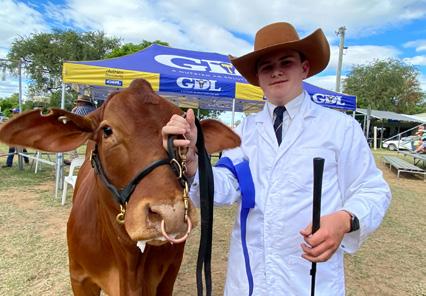
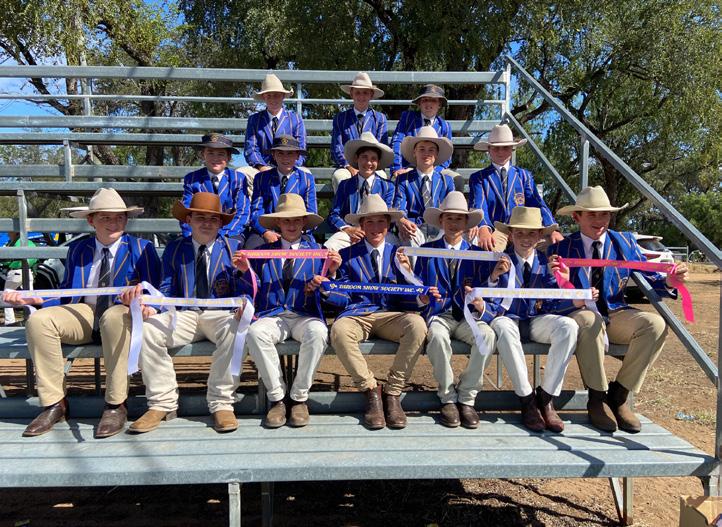
The boys have been competing in the Young Judges’ competitions at a range of shows across Queensland. The Young Judges’ competition is based on the goal of expanding the boys’ knowledge of the skills that are a foundation of the animal production industry, helping them as youthful individuals to develop their careers within agriculture. With this in mind, the boys are asked to outline their reasons for placing the animals in order from 1st to 4th and justify their positions. The task of judging is a subjective one, based on selected production systems and changing market conditions. It is important that entrants can use their skills and articulate their approach. The competition teaches the boys life lessons in presentation, decision-making and justification of observations.
Whilst competing across Queensland, the boys have been able to experience rural communities, allowing boarders to participate at their local shows whilst also allowing dayboys to immerse themselves in rural communities. Through supporting agricultural shows, the boys can see rural communities come together and support their successes.
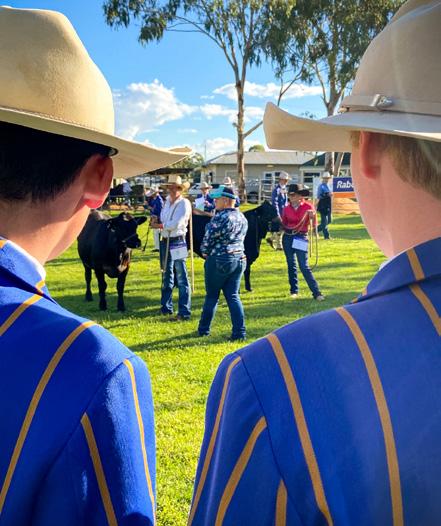
“Ag shows are the heart and soul of our regional communities. They bring and keep communities together, link the country to the city and provide a key boost to these local economies. These events showcase the hard work and
innovation that goes into producing Australia’s food and fibre.”
Hon David Littleproud MP Leader of the National Party and TGS Old Boy (1992-1993)
A number of the boys involved in the team have also had the ability to compete in the Young Paraders’ competition. This event showcases the boys’ ability to prepare and present the animals by parading the animals before the judge in the ring. This was a highlight for many of the boys, preparing animals that were over ten times their size. The boys have also had the opportunity to learn more about the beef industry with a tour of Oakey Beef Abattoir. This provided further links to the changing market conditions and showed a range of professional careers within the agricultural supply chain.
The Show Cattle Team allows the boys to connect with one another and champions all boys who have a passion for learning. The team comprises 25 secondary boys in total and is a healthy mix of both boarders and dayboys. The boys need no prior knowledge and learn all aspects of the judging processes in weekly “meatings”.
“We moved from Brisbane to Toowoomba at the beginning of 2020 with our two ‘city kids’. The Show Cattle Team was one of the first extra-curricular activities that our son wanted to participate in, and it has been fantastic watching him, and the other boys, progress so well. Not only does it provide
education about different aspects of animals to consider, but it has given the boys great exposure to public speaking and teamwork.”
Emma Luscombe, ParentIt is the long-term goal for the team to be showing our own cattle, allowing the boys to have a greater connection with the cattle. The boys would be learning animal handling skills, husbandry and preparation. This will give an opportunity for many of our students to shine by showing their dedication to the competition. By providing opportunities for all boys to succeed in their chosen field, the TGS Show Cattle Team is just one more reason why Toowoomba Grammar School is leading the way in providing a wellrounded boys’ education.
By Mr Jack Murphy, Teacher of Industrial Technology & Design & Coordinator of TGS Show Cattle Team Ribbons galore at the Taroom Show Year 9 student, Darby Humphreys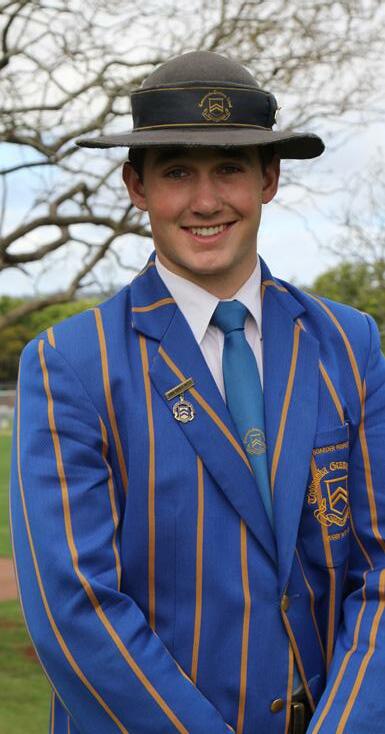
Toowoomba Grammar School’s creed has four main points; give everyone a fair go, respect others and respect difference, and do your best. Whilst all these are incredibly important, the final one that overarches all these, and what the entirety of the School stands for, is the quality of being honest. Honesty is a characteristic that binds those who pass through TGS, as it is something that is found in each and every one of us.
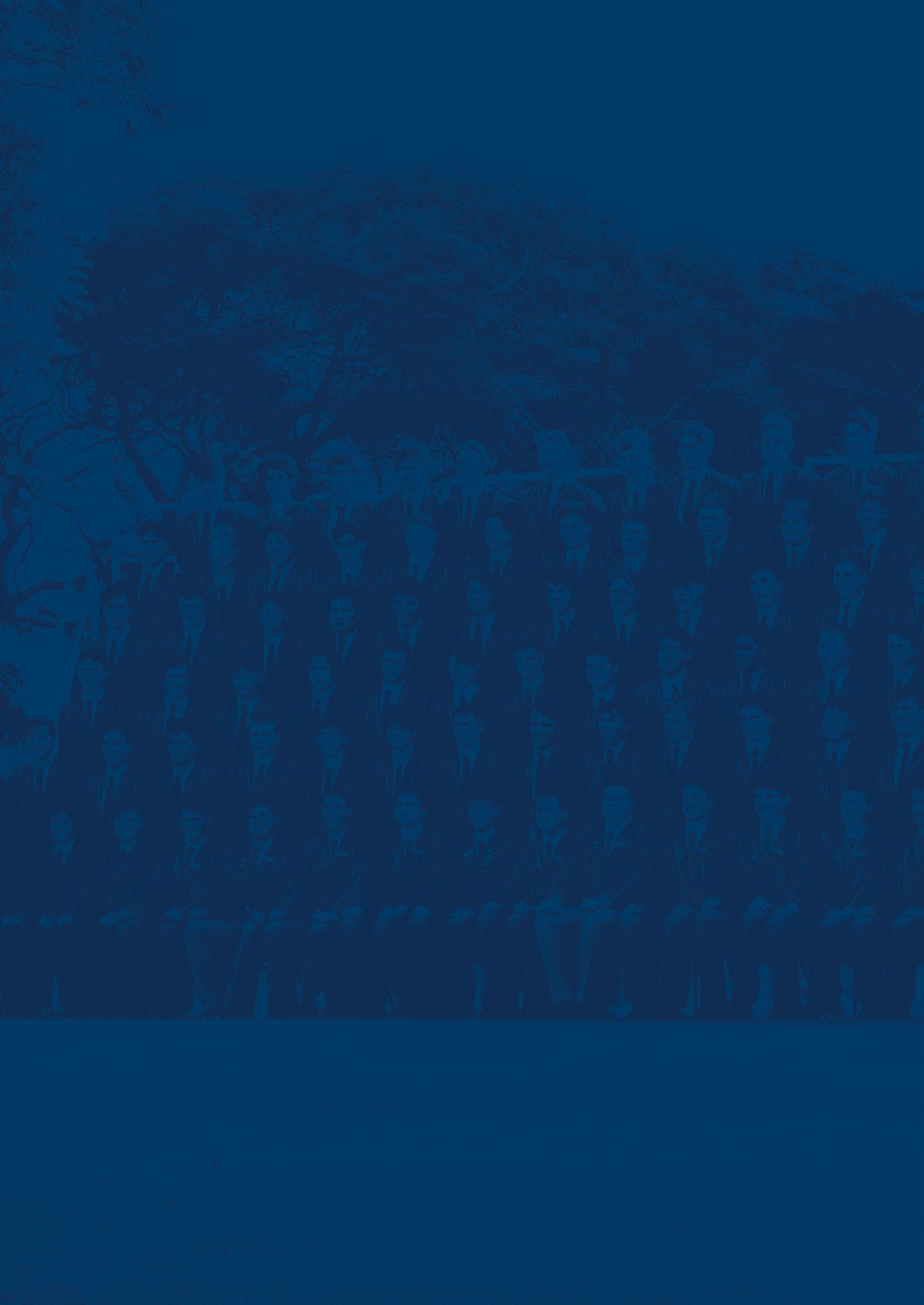
I commenced my time at TGS in 2018 as a Year 8 boarder in Taylor House. Being named Senior Prefect for 2022 near the end of Year 11 (Term 3 2021) was a moment when the values that the School has instilled in me throughout these years became even more apparent. Whilst the feelings of anxiety were unbelievably high at this moment, I came to the realisation that the School had given the concept and opportunity for leadership to not only me, but to every boy who walks these hallowed grounds.


Taking on the role of Senior Prefect has allowed me to continue to build on these leadership values, which consist of ideas such as leaders are servants in their community, that leadership is unavoidable, and leadership is about positive relationships. The opportunity to be Senior Prefect has enabled me to continue to learn leadership, although, personally for me, it has been about giving back to the School, as I understand how much it has helped me grow and develop as a person.
This year has been a journey where I have learnt many lessons in leadership, but also more about myself too. The public speaking and speech writing are two things that have come more naturally as the year has progressed, although the idea of servant leadership, and putting others before yourself is something that will stay with me forever. Servant leadership (selflessness), and the ability to connect to those around me on a different level, so I can help and understand any individual, no matter
their background, is a characteristic that I will carry with me into college, university, and the years beyond.
Whilst looking to the light at the end of the tunnel, it is easy to forget to stay in the moment. The Prefects of 2022 have completed their Prefect Plan and are proud of the legacy we will leave. At the conclusion of 2021, at our leadership retreat, all 20 Prefects sat around a group of tables in the Bunya Mountains, and after hours of planning, we decided that our vision was to create a unified, respectful community to help hold ourselves and others to a higher standard within Toowoomba Grammar School’s culture. To achieve this, we specifically looked at how “it’s all the small things that make the big things happen”.
In many years from now, we hope that the Year 7s of 2022 still remember their Prefect group and that they will still be promoting the Blue and Gold culture that we continued to build during our year as Prefects.
Charlie Horn, Senior Boarder Prefect Daniel da Silva, Senior Dayboy PrefectI started my journey at Toowoomba Grammar School in Year 7, 2017 as a Stephens boarder. Still to this day I can remember sitting in the crowd within the Assembly Hall admiring the three young men up on stage. I never thought I would get the opportunity to be like them and to lead the School, specifically the boarders. I was very honoured when the Headmaster, teachers and my peers trusted and believed in me to do the job at hand.

From the one-on-one chats I have had with either a boarding staff member, or a teacher from the day school, I believe these are some of the most important things to experience and are what have developed me into the person I am today. It is the help and support that you are surrounded by when you are at school or in the boarding house. Living amongst your peers teaches you to appreciate everyone and to understand all different personalities. Most importantly, it teaches you boundaries, and about being a mate for one another.
These life skills have not only helped me throughout school but are also helping me develop in the outside world. Social interaction is a lifelong skill that everyone needs and boarding at TGS has helped me gain this skill. It is something that I personally think is a great trait. Another life skill TGS has not just imprinted on me, but every boy who finishes school here, is the skill of simply being a good man. It is about looking after your mates in tough times, helping people in need, working hard, and the list certainly goes on. For me, these are some of the main traits TGS has left for me and every other boy too.
As everyone knows, COVID had a big impact on our normal expectations, activities, and events at TGS. The 2022 Year 12s have enjoyed being part of the return of the rich culture and wonderful traditions of TGS, such as spectators at sporting fixtures, and singing hymns and the School song again at assemblies. It was not just the things that are obvious to the public, but the small, unseen things that went missing throughout
The fast-paced nature of TGS left the Prefects of 2022 reflecting on the victories and challenges of the past year. From the annual Prefects’ Retreat to the end of our schooling careers, it is safe to say that we have all felt the impact of such an eventful period. In the day school, the Prefects of 2022 hope we left behind an enduring sense of connection amongst the student body, with student engagement continually topping the agenda as one of our highest priorities.
To have had the opportunity to be at the forefront of change within our School community has truly been a life-changing experience, and
the pandemic. Whether this be the interactions between older and younger boys, or the pure passion that is shared throughout the whole School community, it has been something that we, as a cohort, have pushed to improve and I know will be continued by the 2023 leaders.
The 2022 Prefect group picked a motto: “it’s the little things that make the big things happen”, which is something we all agreed to stand by the whole year. It is a motto that I know each and every one of us can take out of our schooling lives and apply to the real world.

one that I am grateful to have had. When I first arrived at TGS, everyone seemed to excel academically, in sport, or the arts. Lacking talent in any of these fields, and feeling very intimidated, it was clear that my successes would only come from hard work. I made the decision to apply myself in every way possible, and it was through this application that I found myself competitive for a position as the Senior Dayboy Prefect. Such an opportunity to become a leader gave me a new perspective on the influence I could have on those around me, and this year has certainly shown that such an opportunity can be quite rare.
As such, I hope to carry this experience with me as I face new and unexpected challenges in the future. We are often told that high school is the end. However, I believe that my time as a leader at TGS, the lessons I have learned from my peers and the friendships I have formed over the past six years, have well and truly prepared me for whatever lies beyond.
Vocational Education and Training (V.E.T) plays a central role in preparing young people

for work, developing skills, and responding to the labour-market needs of the economy.
As the V.E.T Coordinator at Toowoomba Grammar School, I have an immediate and positive influence on our young men’s skills, employability, and career development. I engage with the most amazing young men to guide their career journeys throughout Years 10, 11 and 12. I also have the privilege to work closely with their parents.
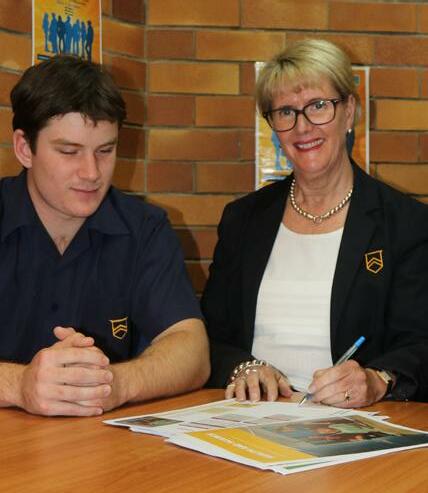
I get to know the boys and commence career pathway conversations during the Career Plan Interviews in Year 10. The boys have already had the opportunity to engage in work experience, a very valuable program that provides an opportunity to engage with businesses and work in a real-life scenario. This gives the boys a good idea if they wish to pursue a career in that chosen industry. University and academia are not for every boy, and if they are interested in vocational study for Years 11 and 12, we are fortunate at TGS to be able to enhance their career pathway through many different registered training organisations. I provide ongoing support so our boys gain extra skills and knowledge to give them the competitive edge when the time is
right to engage in a school-based traineeship or an apprenticeship.
I have been the V.E.T Coordinator for several years which has enabled me to connect and develop positive relationships with many businesses and organisations. These connections enable TGS to offer a vast array of work experience options, traineeships, and apprenticeships with extremely successful outcomes. Added to that, we offer a huge variety of short courses through our TGS Careers Program to enhance the employability of our boys, everything from Certificates in Chemical Management or Aviation (flying drones) to First-Aid or White Cards.
Employers recognise that TGS boys are equipped with an excellent skill set and sound values, including being well-mannered and hard-working young men. Our boys are highly regarded, and I have many employers contacting me regularly looking specifically for TGS boys to engage in work experience in the hope of signing them into apprenticeships.
Thanks to the support of the fantastic TGS Careers Department team, I have been involved in many success stories during my time here. That is the beauty of my role, I have the best job in the world! I still, after all these years, get goosebumps when a boy has achieved success in his chosen career path. It is a job that is truly rewarding and keeps giving positive outcomes. I have been blessed to witness the success of many Old Boys who have set up their own businesses and those who have become qualified apprentices.
The connection with the TGS Old Boy network is also a precious gift. Our Old Boys are fantastic role models for our current young men. Many are so giving of their time and provide opportunities for work experience, traineeships and apprenticeships or they come to the School to share their stories and advice.
I continue to look forward to working with our young men; supporting and guiding them to have enjoyment and success on their vocational pathways and career journeys.
Mrs Marian Rathie with Joe Johnston“The V.E.T pathway is helping to achieve my goals of getting a trade and to be prepared to get a job when I finish school. I am getting a head start on my apprenticeship while still being able to finish my schooling.
Not everyone wants to go to university and the V.E.T pathway gives you a head start and ultimately a great chance of getting a job as soon as you finish school.”
“University was never going to be for me, so it was good to have the backing of Toowoomba Grammar School’s V.E.T pathway to get into the workforce and start my apprenticeship earlier.



It’s important to offer programs like this so that students like me can experience different trades to see what suits them for their future. Mrs Rathie has been a massive help and she can’t be thanked enough for the huge amount of work she does for not only me, but all the V.E.T boys at TGS.”
“I am doing my school-based apprenticeship in carpentry. I really enjoy the trade as it has always been a passion of mine to build houses.
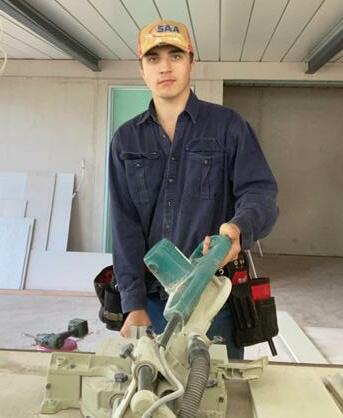
The V.E.T pathway has really helped me through school as I have never been a very academic person, always wanting to be outside instead. I like being hands-on and learning a trade.”
“I’m involved with the V.E.T program at TGS doing my Certificate III in Carpentry. I’ve enjoyed starting an apprenticeship while finishing the last two years of school as I get a taste of the real word and a head start on other school leavers.
I would strongly recommend this program to other students looking to potentially start their apprenticeship when they leave school as it could potentially set you up for life.”

My first experience of a boarding school was when I stepped into the boarding house at Farrer Memorial Agricultural High School in Tamworth NSW, in January 1992.
I wanted to be there.
I was excited about the connections and friends to be made, the activities and sports offered, and the opportunity to attend a bigger and better school. It was a time when Year 7 and 8 dorms were comprised of 16 single beds in one big room, and a cupboard for each boy at either end of the room was the standard.
Boarding, society and expectations have changed; students, families, and teachers have all changed over these 30 years. However, the core of what we do has not changed. We strive to build connections and relationships with students, and at Toowoomba Grammar School, it is with the boys who, for whatever reason, are unable to stay at home and are now at boarding school
for a quality education and experience. While fostering these relationships and supporting the boys, we take our responsibilities seriously as we must ensure that in the well-being and safety of the boys, your son is our priority.
Boys need to be comfortable and confident at school, and this comes as a result of a combination of factors; their own developed competence, the shared experience of a supportive boarding environment and knowing they are safe. Boys need to be supported in the early years to build this competence, learn how to get help, be organised, and handle challenging situations.
It is personally and professionally satisfying to see boys and boarders grow their competence and develop the willingness to engage and embrace all opportunities available to them. We do battle the barriers that hold our boarders’ attention, predominantly technology and the smart phone. It is therefore essential to stay true to our values and experience to guide our boarders so that they can enjoy what they may otherwise miss.
Working in a boarding school has been a privilege for me and the life we love for our family. Having been part of school communities across Australia and overseas, we have engaged with families, teachers, and international staff. However, the best part of the role is seeing boys and boarders achieve more than they thought they could, be challenged and raise their standard, grow their character and leave school with fond and meaningful memories.

Graduates of Toowoomba Grammar School uphold a rich tradition as men of character, integrity and honesty. These are characteristics highly valued and developed over years through a sense of belonging and connectedness to something bigger than “self”.

In the unique environment of a boarding school, students live with the added complexity of developing their character and sense of identity away from the daily support of their parents. House staff and their families bridge an important gap in this space. With guidance, encouragement and support, our boys develop the skills necessary to grow in character. However, this cannot be achieved without the support of our parents. Their connectedness to their sons, class teachers and boarding staff is the key to a successful boarding experience.
The phrase “it takes a village to raise a child” conveys the message that it takes many people to provide a safe, welcoming, secure, and healthy environment where boys can flourish. Boarding staff and parents working together to ensure our boys are
listened to, valued and supported throughout their journey, create that village. We work closely with families to foster open relationships, communication, and transparency. The more open the lines of communication, the more transparent the program, the more able and willing each party is to work in collaboration, then our boys will be better equipped to declare their own agency, are more able to face adversity and develop the skills required to be resilient, active contributors to society and men of good character.
With the complex inter-relationship between parents, staff and students working in unison, boys in boarding will flourish. They will be happier, more engaged in each aspect of school life and seek opportunities to extend their capacity.
 Mr Eugene Massi with his wife, Karri and daughter, Emilia
Mr Eugene Massi with his wife, Karri and daughter, Emilia
One of the most enduring traditions of Toowoomba Grammar School is its Cadet Unit, one of the oldest in Australia and the longest continuously serving in Queensland. Officially launched by the Governor of Queensland in 1892, TGSACU is celebrating its 130th year in 2022.
Throughout history, TGSACU has been well represented, with Old Boys taking part in all major conflicts over the last century. Some notable mentions include Australia’s first general, Sir Henry “Harry” Chauvel (1880-1882), and CAPT T C Hewitt (1907), a teacher and commanding officer who was killed in France during World War I.
When war broke out in 1914, 359 TGS Old Boys enlisted, with 62 paying the ultimate sacrifice. This year, at the TGS ANZAC Day Service, the current students and cadets paid homage to these courageous men through the flag placing ceremony.
Cadet membership returned to being compulsory in 1939 when World War II broke out. TGS boys worked to raise money to support the war effort, and the School donated two Red Cross military ambulances in 1939. Some 1350 TGS Old Boys volunteered for active service during WWII, with 122 killed and 40 awarded medals for gallantry.
While the history of TGSACU is significant, the values of quality leadership training and youth development through challenging activities continue to make the program relevant today. Through the core values of service, courage, respect, integrity and excellence, the Cadet Unit empowers our students to achieve the best they can.
Cadets in their first year undertake a rich learning program that aims to develop their individual personalities and foster teamwork. Recruits participate in activities that promote self-identity, leadership, confidence and independence and that develop the basic skills for cadets. This includes standards of dress and basic drills before learning the necessary skills for living in the field, such as health and hygiene, cooking, navigation, shelter construction and survival. There are also various adventure activities such as military obstacle courses, weapons training and rock climbing. By the end of the year, the recruits have grown, increased their independence, and forged new friendships.
Second-year cadet training aims to develop a higher level of skills with an emphasis on leadership and building resilience. They are encouraged to develop self-discipline, initiative and self-reliance through training in areas including navigation, communication, first aid, bushcraft, drill and leadership.
As well as advancing their skills, second-year cadets now have the opportunity to attend their first promotion courses and earn rank.
In these courses, cadets participate in abseiling, trekking, night-time navigation, observation and deduction, reconnaissance, and search and
rescue. By the end of their second year, TGS cadets stand straighter, prouder and with more fortitude. Resilience is created.
To facilitate the fostering of the key qualities of leadership, the continuing cadets undertake a challenging and sequential program that ensures they are equipped with the knowledge and skills required to perform their role at the highest standard. Senior cadets are taught the complexities and problems of leadership with young cadets and how to implement engaging and exciting lessons. They are tasked with planning activities, maintaining discipline, leading large groups of cadets and the day-to-day operations of running a cadet unit. Cadets who reach this level have successfully demonstrated the core values of service, courage, respect, integrity and excellence.
Throughout history, TGS Army Cadets have demonstrated the positive impact of the program on the development of youth. As the cadets mature, we witness the growth of self-confidence, leadership skills, social skills, strong bonds and teamwork.
Scan to learn more about Cadets at TGS

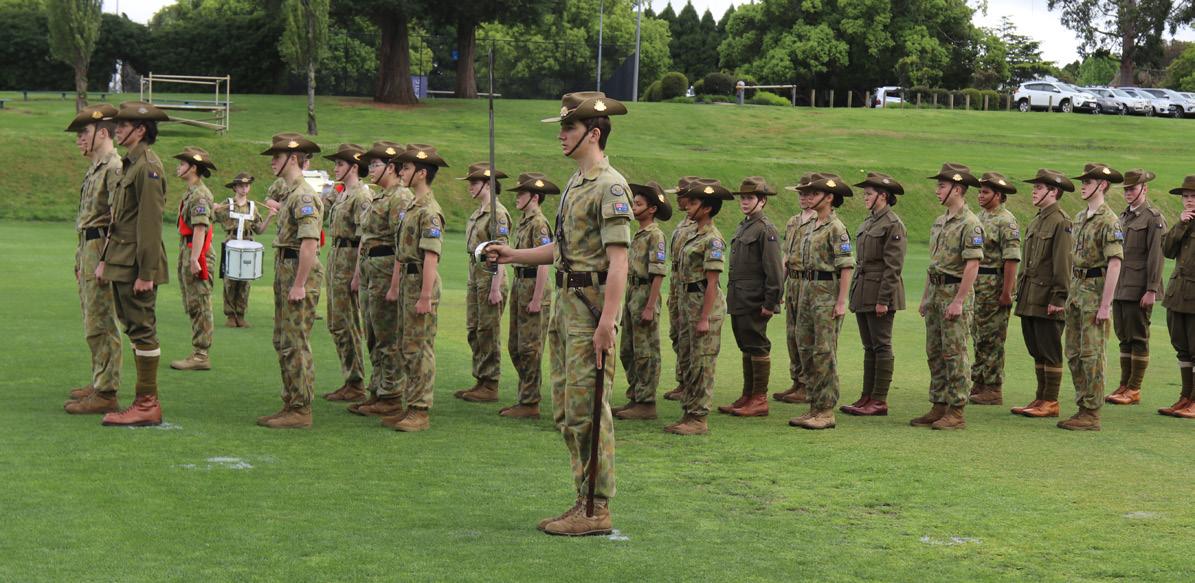


 2022 March Out Parade led by Daniel da Silva
Abseiling Teamwork and navigation
2022 March Out Parade led by Daniel da Silva
Abseiling Teamwork and navigation
At Toowoomba Grammar School, our P to 12 Basketball Program looks to build GREATness (Grammar Values, Resilience, Execution, Accountability and Toughness) in
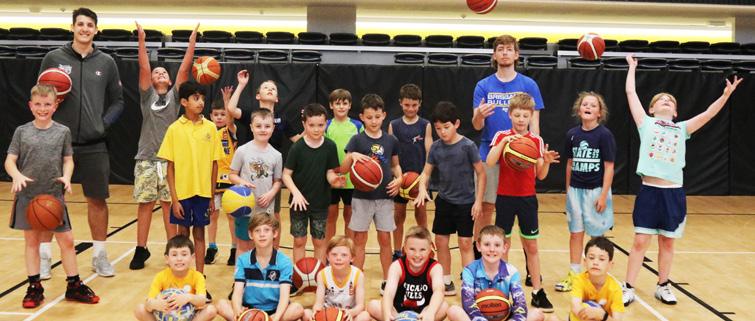
every boy, regardless of age or ability.
We place a premium on academic success and focus on the core values of programfirst thinking and developing not just the student-athlete, but the young man.
TGS Basketball appeals to a wide range of basketball interests and abilities and looks to create positive experiences and outcomes for all. Our program offers a range of basketball opportunities for the high performance and participant-level athlete across two key strands of our program:
Performance Squads: A Teams, Emerging Player Squads, 1st V.
All-In Squads: B-D Teams, TGS Club Basketball Teams, Grammar Junior.
We view our role as coaches within the TGS Basketball Program as those who provide a platform through which boys can acquire, apply, and achieve across a variety of skills and competitive outcomes. We look to match the ability of the player with the appropriate strand of our program offerings and apply the TGS Basketball “Style of Play” and “Skills Matrix” through that avenue.
From a cultural standpoint, TGS Basketball is built on the back of three core values: Family First, Empty the Tank and Sweep the Sheds. For us, these pillars transcend the performance element but allow for all boys to measure themselves and be successful in their own contexts on and off the court. We instil these from the very first time a boy
puts on the TGS jersey, all the way through until graduation, always spotlighting the importance of consistency, continuity and growth.
Family First – this is central for us. Are we being selfless in what we do? Do the needs of the many outweigh the desires of the one? What is important to us as a whole? And if all goes haywire, when all is said and done, we remember to reunite as a family and move as a group.
Empty the Tank – very simple. Give your absolute best in everything that you do. Leave the floor and any situation having given your all and having done everything you can to be successful. Be the best version of yourself that you can be for you and for the people in your circle.
Sweep the Sheds – the old All Blacks mantra and the idea that no one person is too important to get in and do the dirty work. For us, it’s about leaving places, situations, and interactions with people in a better condition than when you arrive. This could be clearing and cleaning the bench at the end of a practice or game; it could be graduating from our program and having such a positive influence that TGS Basketball is better for having you in our family; or it could be as small as a conversation, finishing with the person you are interacting with in a better space than before you spoke.
The real-world applications for these are endless and I’m proud to see our boys from Year 1 all the way through to Year 12, embody these values every day. If our boys
grow within our program and depart TGS and TGS Basketball as better human beings then we, as coaches and staff, will have done our jobs.
The immersion of TGS Basketball within the Club Basketball competition over the last few years has afforded our boys increased opportunities to grow within the game. Our youngest boys are just seven years of age, playing 3X3 and 5 on 5 for the first time ever. We hope that, over time, they, and the rest of our 101 players, may come to represent one of our year-level teams and perhaps even our 1st V in the TBA A Grade competition.
Each year we benefit greatly from being a Partner School of the Brisbane Bullets NBL Franchise. This relationship has been crucial in not only growing the profile of Basketball at TGS, but also allowing our boys to grow up as fans and with heroes within the game. The partnership serves to provide opportunities for inclusion, development and engagement with elite athletes and coaches and has already seen some of our coaches and Old Boys create links with the Bullets. This sees our boys and coaches rub shoulders with Bullets players and staff through a number of initiatives across 12 months of the year:
» Bullets players and coaches conducting clinics and games in Grammar Junior School PE lessons.
» Brisbane Bullets High Performance staff mentoring our coaches across a number of technical, tactical and pedagogical areas.
» Bullets players and coaches assisting with All-In Camps, A Squad Camps, development clinics and community programs.
»
Our performance players benefiting from visits to the home of the Bullets, Nissan Arena, with an all-access tour, on-court clinic with players and coaches and even competing in a half-time showcase game.
Our work with the Brisbane Bullets is the perfect complement to our goal of creating an inclusive and engaging program, dovetailed with a holistic athletic development model and a pathway for the future success for our TGS men.
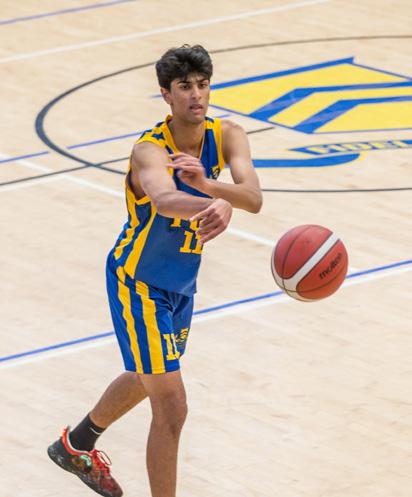



Through our growing initiatives, and our blossoming partnerships, we have seen a number of TGS Basketballers go on to secondary basketball opportunities both domestically and abroad. A number of boys have represented their Association in either the Queensland State League or NBL1 (semi-professional leagues), while a number have experienced increasing success on the recruitment front. Over the last few years, we are proud to have seen several TGS boys offered positions in North American College Basketball and Degree programs:
Harrison Hornery – Mater Dei HS (California) and University of Southern California
Jack Wagner Ottawa University (Kansas)
Jason Spurgin University of Southern Utah
Greg Spurgin
Westminster College (Utah)
Joshua Allen College of the Siskiyous (California)
Bailey Biggar Medicine Hat College (Canada)
We look forward to continuing to reap the benefits of our programs and partnerships through the growth of our sport at TGS over the coming years with a view to book a permanent place in the top places of the GPS competition and state rankings.
The 2022 1st V Basketball squad will be forever etched in the pages of Toowoomba Grammar School history as the first TGS team to win a GPS Basketball Premiership since the competition commenced in 1984.

“I am really excited for the boys to get this first Premiership,” said Head of Basketball and 1st V Coach, Kabe Cicolini who has overseen the program since 2018.
“For me personally, it’s a weird sense of accomplishment and relief; we’ve been toiling away quietly for a long time so it’s great to see the hard work come to fruition.”
Kabe said the TGS team was definitely not the most talented in the GPS competition, but led by captain Rufaro Zimbwa, they had common values and expectations; they focussed on a game-by-game scenario rather than becoming overwhelmed by their good results or looking too far ahead.
“We weren’t expecting to achieve as well as we did each week, but the boys kept growing, and as a result we could keep going without putting too much pressure on ourselves,” said Kabe.
The Premiership-winning match against Gregory Terrace was a nail biter. TGS had a comfortable 14-point lead going into half time (45-31) and were 59-48 coming into the third quarter but GT turned it on with the scores tied at 63 with two minutes remaining and 65 all with two
1.4 seconds remaining!
“I’m immensely proud of the boys,” said Kabe.
“We are so young, so I’m proud of their resilience and ability to achieve what they have already.”
“I’m excited for next year too, as we have the same boys’ group, so I’m content with what they’ve achieved. I’m ready to move on to the next challenge.”
seconds on the clock. Year 10 student, Samuel Geu then had a moment that dreams are made of - he hit the winning shot with just 2022 1st V GPS Basketball Premiers Year 10 student, Samuel Geu hits the shot of his dreams to lock in the premiership Tawana Ngormia beats the GT defence


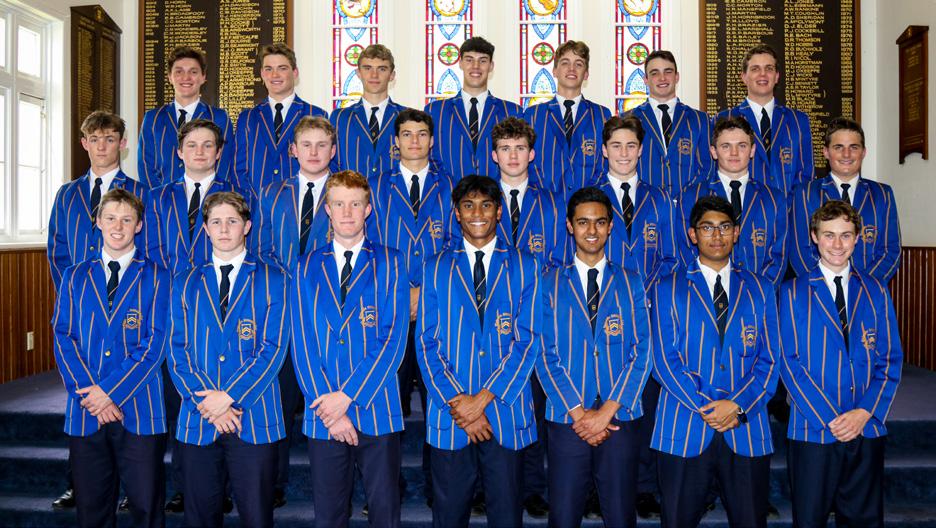
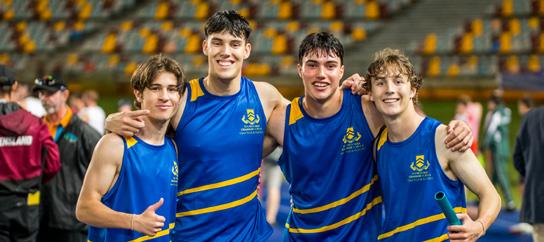
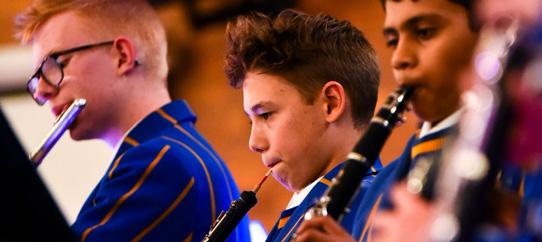
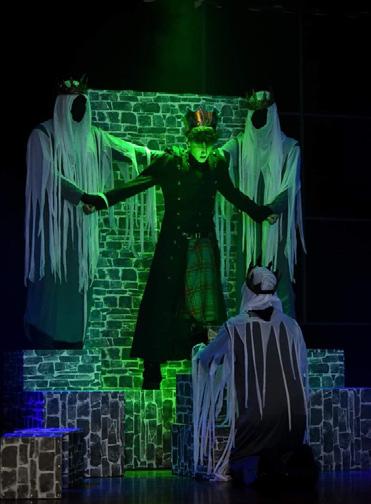 2023 Senior Prefects
Front Row: Sam Hoffensetz, Richard Dean, Pat Savill (Senior Boarder Prefect), Thisaja Samarawickrama (Senior Prefect), Riyan Khan (Senior Dayboy Prefect), Shafiuddin Aanan, Sam Gladwin
Second Row: Beau Campbell, Will Anderson, Jeremy Zuyderwyk, Clancy McCosker, Will Street, Edward Rogan, Noah Taylor, Isaac Burke
Back Row: Will Smith, Clancy Wright, Jimmy White, Carter Liddiard, PJ Ostwald, George Griffiths, Sam Freer
Headmaster, Dr John Kinniburgh presents 2023 Senior Dayboy Prefect, Riyan Khan with the Prefects’ Oath
2022 March Out Parade
Shakespeare in the Grove “Macbeth”: Jamie Watson (centre), Shafiuddin Aanan, Juert Eerkens, Gabe Donaldson
Shakespeare in the Grove “Macbeth”
Aimon Rowe, Finlay Waring and Jay Pradeep performing at the 2022 Instrumental Showcase
2023 Senior Prefects
Front Row: Sam Hoffensetz, Richard Dean, Pat Savill (Senior Boarder Prefect), Thisaja Samarawickrama (Senior Prefect), Riyan Khan (Senior Dayboy Prefect), Shafiuddin Aanan, Sam Gladwin
Second Row: Beau Campbell, Will Anderson, Jeremy Zuyderwyk, Clancy McCosker, Will Street, Edward Rogan, Noah Taylor, Isaac Burke
Back Row: Will Smith, Clancy Wright, Jimmy White, Carter Liddiard, PJ Ostwald, George Griffiths, Sam Freer
Headmaster, Dr John Kinniburgh presents 2023 Senior Dayboy Prefect, Riyan Khan with the Prefects’ Oath
2022 March Out Parade
Shakespeare in the Grove “Macbeth”: Jamie Watson (centre), Shafiuddin Aanan, Juert Eerkens, Gabe Donaldson
Shakespeare in the Grove “Macbeth”
Aimon Rowe, Finlay Waring and Jay Pradeep performing at the 2022 Instrumental Showcase



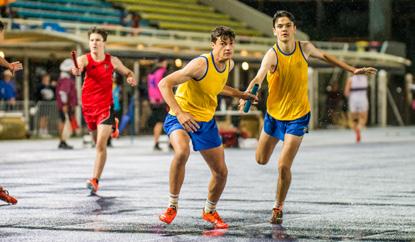
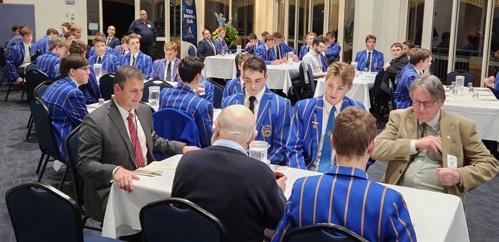
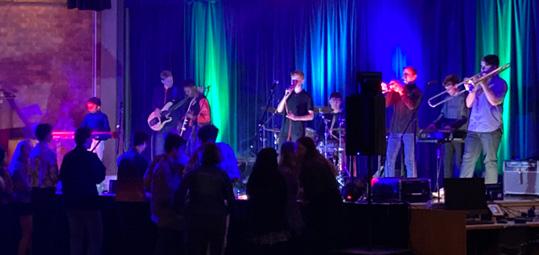
 Years 10 to 12 Pro Summa Diligentia recipients
Battle of the Bands
Clancy McCosker and Jake Roach in the relay at GPS Track and Field Championships
Year 7 student, Dom Seaby competing in high jump at the GPS Track and Field Championships
2022 Year 12 Special Award winners
Interact Changeover Dinner
Years 10 to 12 Pro Summa Diligentia recipients
Battle of the Bands
Clancy McCosker and Jake Roach in the relay at GPS Track and Field Championships
Year 7 student, Dom Seaby competing in high jump at the GPS Track and Field Championships
2022 Year 12 Special Award winners
Interact Changeover Dinner
The Toowoomba Grammar School ovals are not painted, dyed or manufactured grass; rather, the glorious green that greets passers-by as they drive into the Garden City comes from the sheer hard work and dedication of our TGS grounds team, led by Danny Beresford.
Danny has exceptional pride for his grounds and a strong family connection to TGS. He is an Old Boy (2002-04) who played for the 1st XV in 2004 and was in the Track and Field team. His mum, Debbie Wells worked at the School as the Head of Athletics from 2002-13. He currently has two boys here, Jack in Year 2 and Max in Prep, and his brothers-in-law are both Old Boys too, Brendan Long (2002-04) and Ryan Long (2002). Danny knows first-hand how much it means to the boys to have a state-of-the-art playing field and the difference it makes to both training and game day.
“I remember the feeling of running down the tunnel for the 1st XV,” recalled Danny.
“It’s special to be part of, particularly Grammar Downlands Day, just the hype around that event is huge. I have never experienced anything like it since I left school. Even with the Athletics team, you would have Year 8 boys coming up to you who just knew you from the sport, it was fantastic.”
Danny started his Greenkeeping apprenticeship at Middle Ridge Golf Club and was there for nine years, before taking up his role with TGS in 2011. He finds great satisfaction in preparing the grounds and ensuring they are always well-manicured.
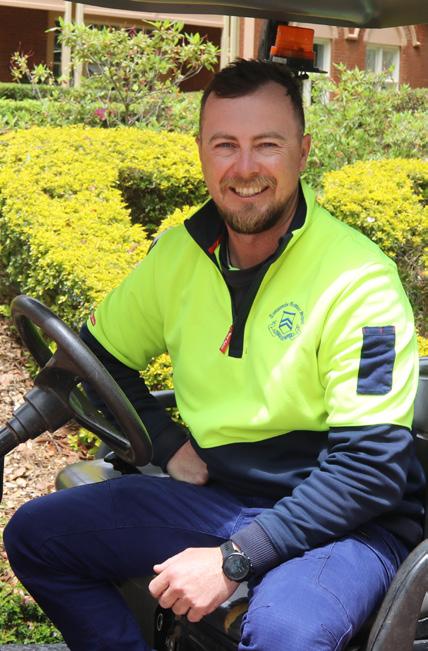
“Our School is iconic and really, it is the gateway to Toowoomba. We are in public view every day of the year, so the entire grounds team wants to make sure it’s always looking the best possible,” stated Danny.
“I love what I do, it’s nice to get compliments from people both within and outside the School. Knowing what the boys need after playing on it myself makes me work harder, and I always want it tip top for the boys.”
The weather is Danny’s biggest challenge, and every year brings different conditions, from drought to frost and floods. He must consider different types of turf, diseases in the grass and the most suitable products for different fields, with the cricket wickets requiring different maintenance to the football and rugby ovals.
“There is only a three-week turnaround between the rugby and cricket seasons and grass doesn’t grow quickly at that time of year, so we need to put down a turf blanket to generate more heat and help the grass grow,” said Danny.
“It is actually very scientific; you don’t just throw some seed down, jump on a mower and cut the grass. Thankfully, over time you get a fair idea of how to manage it all and what is needed to make the ovals immaculate in time for the next sport.”
Football and rugby seasons are Danny’s preferred fields, as it takes five days to prepare the cricket pitches which are very demanding and finicky, sometimes pulling covers on and off as often as three times a day.
The highlight for him so far was leading up to Grammar Downlands Day in 2018.
“It had been a really dry season and then very frost affected, so all the surrounds were dull, but Old Boys’ Memorial Oval was just a glorious green patch in the middle,” reminisced Danny proudly.
“It looked like carpet; I didn’t want anyone to play on it!” he joked.
Kikuyu and couch turf is used on all the TGS ovals, with Old Boys’ Memorial Oval over-sown with rye grass, giving it that rich “fake” green. He credits his great team of groundsmen, Murray Janke, Micah Mathewson, Cameron Ott, David Taggart and Dylan Anderson-Levande as making his job easier and ensuring the School always looks pristine; not just the ovals but the glorious garden beds, trees and hedges that are planted, pruned, mulched, hedged and budded year-round.
“It’s like maintaining a mini city, we’re flat out all the time especially as we hold more and more events and carnivals.
“And no, I don’t take my work home with me,” laughed Danny, “My yard at home looks nothing like this!”
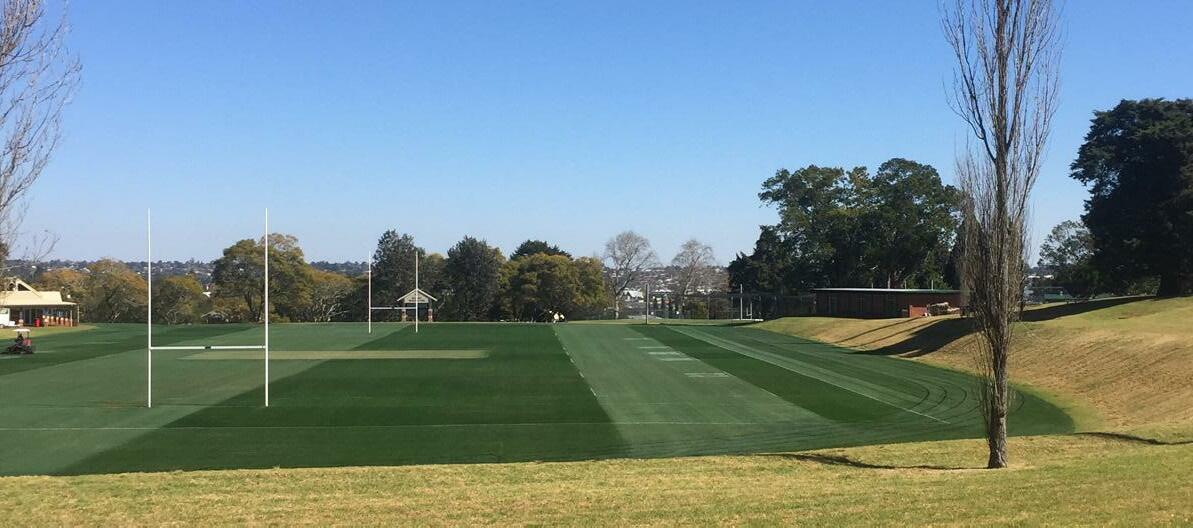

 (L–R): Micah Mathewson, Murray Janke, David Taggart, Dylan Anderson-Levand, Danny Beresford, Cameron Ott
TGS Old Boys’ Memorial Oval ready for rugby in 2018, one of the highlights of Danny’s career
(L–R): Micah Mathewson, Murray Janke, David Taggart, Dylan Anderson-Levand, Danny Beresford, Cameron Ott
TGS Old Boys’ Memorial Oval ready for rugby in 2018, one of the highlights of Danny’s career
The boys at Grammar are becoming standouts in educating the community about domestic violence with record numbers joining the White Ribbon Committee this year.

Toowoomba Grammar School became a White Ribbon School in 2017. The White Ribbon Committee was formed with the purpose of educating and raising awareness about domestic violence issues with the students and our broader School community.

The Committee is passionate about eliminating gendered violence, encouraging students to end men’s violence against women and girls, and promoting gender equality for men to build positive, healthy, and respectful relationships into the future.
For me personally, the decision to be part of this committee was easy. I still remember the White Ribbon Race in 2018 and being nominated to run in the event. I remember seeing Old Boys’ Memorial Oval covered with white ribbons. I was instantly intrigued and fascinated, and I wanted to learn more
about the White Ribbon Committee and how I could contribute. I believed that through being involved I could learn more about the issues of domestic violence in my community and understand the impact that I could have in changing the attitudes of others, whether that be my friends or family. I think the most important part, but sometimes the most difficult, is coming together and simply discussing these issues with the hope of changing attitudes and behaviours.
The Committee has successfully raised awareness about these issues through various activities held each year. Most notably, the White Ribbon Committee has been involved in hosting the White Ribbon Gift at the Term 2 Track and Field Carnival, and the annual ‘Christmas in July’ white-themed dinner for boarders.
There has been a positive and strong uptake in the involvement of students in the Committee, which has steadily increased each year, leading to a record number of 66 students joining the Committee in 2022.
These students, consisting of Years 11 and 12 boys, have played an active role in promoting the issues of domestic violence in our community. This has included encouraging boys to change their conversations about women during lunch time, discussing respectful relationships during Pastoral Care Groups, placing posters around the School, assembly addresses, social media posts, and participation in
White Ribbon themed events. TGS boys are passionate about doing the right thing and educating each other about treating women with respect and learning what having healthy relationships look like with their own family and with girls.
I have thoroughly enjoyed my involvement in the White Ribbon Committee this year, it has been incredibly rewarding and fulfilling. I believe that I have grown personally by broadening my perspective and gaining a deeper understanding about domestic violence in my community. For me personally, a memorable highlight was my involvement in the filming of the “Not in Our Community” campaign earlier in the year. I am proud of the TGS commitment to speaking out about, and acting on, domestic violence. I believe this will play an important role in contributing to the education of our community in preventing men’s violence against women.
The awareness spread through the White Ribbon Committee will have a tidal effect on the School’s culture and the wider community moving forward. I think all boys should be part of the Committee at some stage during their time here.
This knowledge and these skills are powerful, they will help to change the attitude of the next generation of men and challenge us to be more respectful towards women and build strong and healthy relationships in the future.
On the first Monday of the July holidays five TGS boys and 12 Fairholme College girls, plus staff, assembled with anticipation at the RAW Impact offices in Toowoomba.
There was much excitement and anticipation surrounding the planned trip to the homeland of the Gungarri Nation, the Mitchell Yumba, for what would turn out to be a perceptionchanging week for all. This was a trip which clearly highlighted the power of shared experience in the process of reconciliation.
These young men and women proved to be an extraordinary group, approaching all that they experienced with a maturity far beyond their years, offering as much as they could to the Gungarri community, absorbing vast amounts of knowledge, and making a significant number of new, yet extremely close, friends.
From the very moment of arrival at the Yumba, when the group was welcomed by elders Auntie Sue and Auntie Saraeva, it was clear that this was an incredible part of the world. There was a palpable serenity, magnified by the area’s history; homeland to approximately 600 people of the Gungarri Nation until they were forcibly removed in 1968 simply because it was deemed too expensive to provide them with sanitation as was dictated by a new law.
It was not until the campsite was unpacked and swags set up that we all began to truly appreciate the value of a campfire in the Maranoa Region during mid-winter. This only added to the experience as the clear night skies revealed to many their first sight of the indigenous constellation of the dark emu.
After the traditional smoking ceremony welcoming the group to the Yumba, we all set to work on a variety of tasks
to help improve this region. The aim was to make it a more welcoming place for members of the Gungarri Nation to return to their former country for community gatherings or for respite and recuperation.
Significant progress was made with building bower sheds that are representing one of the aboriginal totem animals, along with improvements to the toilet and shower facilities and clearing old timber from a large fire pit where groups traditionally would have met for a yarn.
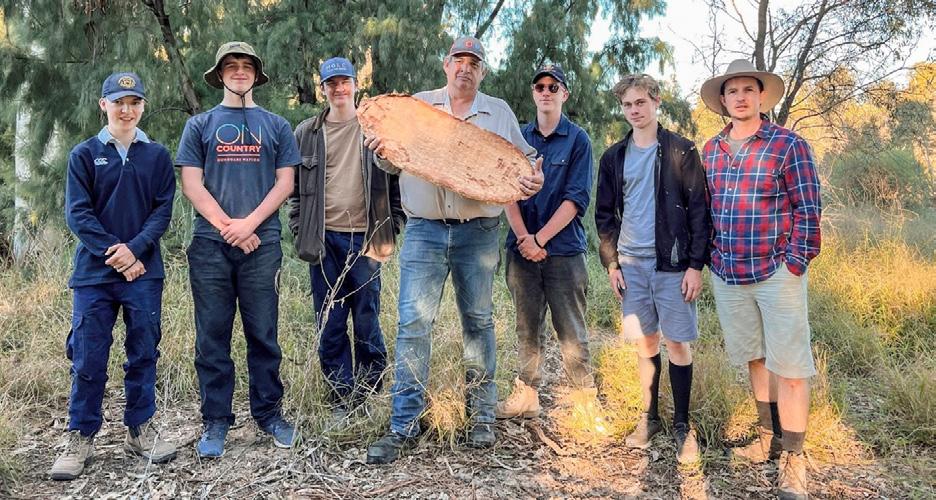
Such activities were interspersed with cultural experiences. The Aunties taught the girls some traditional skills, such as soap making and basket weaving, while Uncle Wayne and Uncle Daen demonstrated leather craft to the boys, as well as making what might be the first coolamon made on Gungarri country by Toowoomba Grammar School boys.
Whilst all this was occurring, Uncle Wayne amused and astounded us with tales of his time living on the Yumba with his family and the mischief he seemed to cause as a young boy –not to forget his enthusiastic tales of hunting echidna for dinner.
We enjoyed excursions to the ancient sites at Mount Moffat, to Major Mitchell’s Camp which is the site of first contact between the Gungarri Nation and European settlers, and to the many wonders of Carnarvon Gorge which were truly awe-inspiring experiences.
For the teachers and facilitators on this trip, the most rewarding aspect was undoubtedly listening to a group of amazing young boys and girls, around the campfire, discussing
how their opinions have changed by what they had seen and heard in just a short space of time. There were mixed emotions of sadness, guilt, and disappointment, excitement, pride and wonder; but it was the sense of progress which was most impressive and the increased awareness of the need for integration and experience as a key part to moving the process of reconciliation forward.
“I gained an understanding of what preserving culture meant. Getting a taste of the vast knowledge and connection with the land that the Uncles and Aunties had gave me an appreciation of what needs to be passed on to the next generation and why it is so important that we do so.
While the racist laws that saw the Yumba bulldozed are gone now, there needs to be actions to help mend the pain that still is felt, such as rebuilding the Yumba and connecting more people to the land.
I think, as Australians, it is our responsibility to learn about the wrong doings of the past as well as working together for a better future.”
It is such views in these young Australians which will make this a stronger nation for all its inhabitants.
Huge thanks must go out to the RAW Impact crew who made such an amazing trip possible, and it is hoped that both TGS and Fairholme College will be able to continue their collaboration on this project in the future.
By Mr Chris Stearn, Head of House - Groom Boarding & Geography TeacherA core pillar of the Toowoomba Grammar School Strategic Plan is to provide an inspiring and broad curriculum for all boys, adopting technology and innovative pedagogy to transform learning outcomes.

Over the last couple of years, the COVID-19 pandemic has prompted teachers to explore new frontiers of pedagogy, adapting to the difficult circumstances by launching interactive software, digitising trusty, tried and true resources, recording our lessons, flipping our classrooms, and cultivating an online presence that was, for most of us, a world away from what our initial teacher training had prepared us for. Teams™ meetings were set up. Channels were created.
And we did our level best to project the passion that we hold for our subject matter and our students into our laptops, through the ether, and into our virtual classrooms… assuming of course that we hadn’t accidentally muted ourselves at the start of our lessons.
This strange new world of online and hybrid learning would not have been possible without innovations in digital technology, a key component of our Strategic Plan. Yet in the many conversations I have had with my colleagues, a single perspective has clearly emerged… our experiences in the virtual space have led to an even greater appreciation for the physical space. The students and teachers spend so much time in the classroom that it’s very easy to overlook the effect of the physical environment on the learning process, but when a makeover opportunity arises, it’s amazing to witness the transformation that can occur.
Constructed in 1981, the Barbour classroom block (named after G. P.
Barbour, Headmaster 1910-1935) is the hub for Mathematics and Languages classes at Toowoomba Grammar School. When they were first built, the austere classrooms featured exposed brick walls and, reflective of a bygone era of pedagogy, a raised timber platform, directing attention to the “Master” at the front of the room.
Over the years, various modernisations were implemented; the stages were removed, creating a more open space, and carpet was affixed to the interior walls, improving the acoustics but doing little to address the lack of natural light. Classrooms were completely separated from each other, and the common spaces in the building were there only to allow the flow of people between rooms.
At the end of 2021, the School embarked on an initiative to modernise and transform the learning spaces in Barbour block. Informed by the experience of the Roberts block refurbishment several years earlier, the architects and design team planned out an educational environment that was formal enough to facilitate a direct instruction approach, yet flexible enough to encourage genuine collaboration within and between classrooms.
The most obvious result of this refurbishment was the opening up of the entire building, both literally (through additional entry points in the downstairs classrooms) and figuratively (through the replacement of interior brick walls with glass and the clever harnessing of natural light in the upstairs foyer).
More subtle perhaps were the changes to the classrooms themselves. Thomas,
Jack Rattray and Mr Greg Bland making the most of the refreshed Barbour classroomsPavlechko and Cassady (2019) define an ‘Interactive Learning Space’ (ILS) as a “specialised environment designed to encourage the implementation of instructional practices consistent with constructivist and connectivist philosophies” (p. 119). Although the large whiteboards and interactive flat panel monitors make the Barbour classrooms ideal for expository teaching, visit the rooms and you are likely to see features of an ILS at work – small groups of students gathered around the many whiteboards, formulating a mathematical solution together, or moving around the classroom to attempt a series of challenge questions.
Furniture can be easily reconfigured, and even the desk surfaces double up as whiteboards. Breakout rooms provide additional opportunities for group work, and perhaps my favourite addition to the architecture
is the booth layout in the upstairs foyer, allowing for extension or remedial instruction and student collaboration, even from a number of different classes simultaneously. The provision of interactive flat panel monitors at the front of the rooms has offered a significant upgrade over the old-style projectors. Not only do these monitors integrate seamlessly with OneNote, but they also present exciting opportunities for students and teachers to explore mathematical concepts interactively.
In a 2021 meta-analysis, Juandi and colleagues found that the classroom use of dynamic geometry software such as Geogebra has a high positive effect on students’ mathematical abilities. When you combine the interactivity of the classroom monitors and student laptops, mathematics can really come to life.

There’s no doubt that the Barbour block refurbishment, with its flexible and open learning spaces, allows for the provision of a knowledgerich curriculum with a focus on core discipline skills and understandings, a key element of the Strategic Plan.
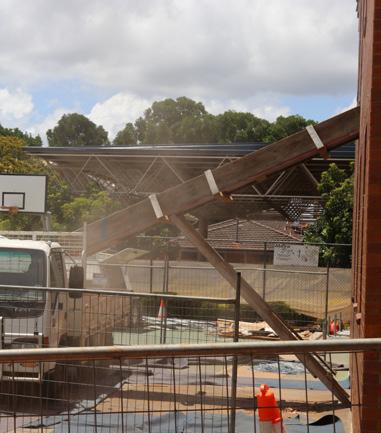

More than anything else, however, it has made our classrooms an even more comfortable and pleasant environment in which to work and learn.
Juandi, D., Kusumah, Y. S., Tamur, M., Perbowo, K. S., Siagian, M. D., Sulastri, R., & Negara, H. R. P. (2021). The Effectiveness of Dynamic Geometry Software Applications in Learning Mathematics: A Meta-Analysis Study. International Journal of Interactive Mobile Technologies (iJIM), 15(02), 18–37.
Thomas, C., Pavlechko, G., and Cassady, J. (2019). An examination of the mediating role of learning space design on the relation between instructor effectiveness and student engagement. Learning Environments Research, 22: 117-131.
Toowoomba Grammar School. (2022). Strategic Plan 2022-2026. Retrieved from https://www.twgs.qld.edu.au/ welcome-to-tgs/strategic-plan
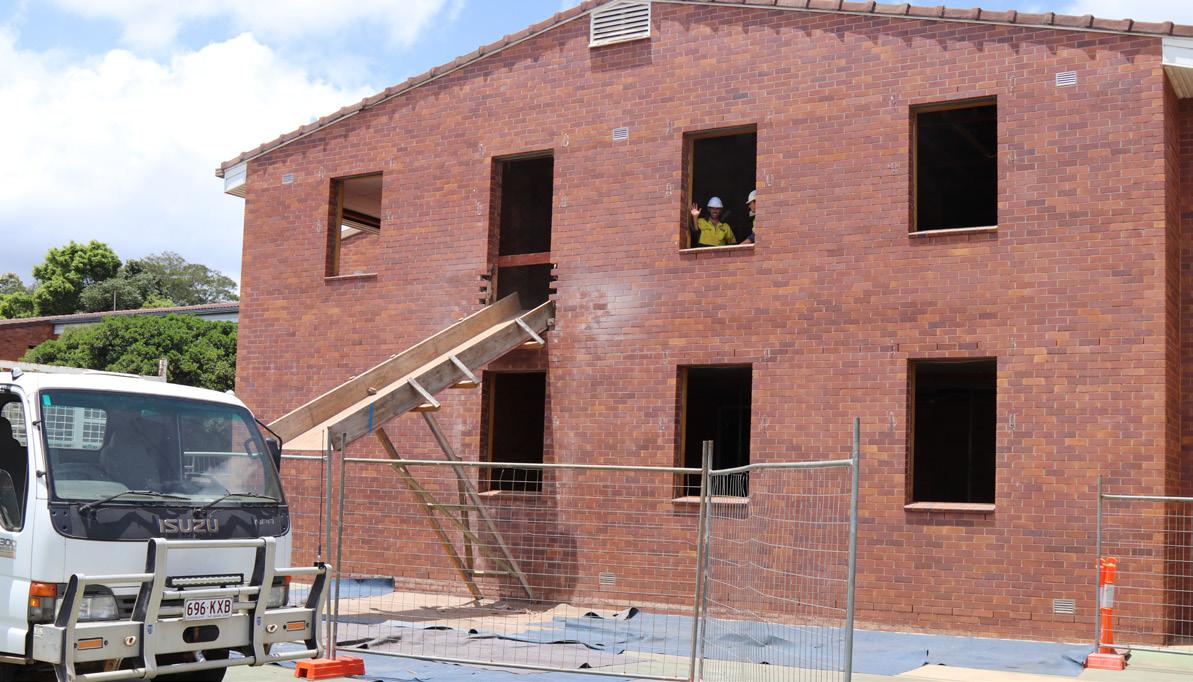 Daniel da Silva and his Year 12 classmates take advantage of the adaptive learning space
Barbour building undergoes a facelift in 2021
Daniel da Silva and his Year 12 classmates take advantage of the adaptive learning space
Barbour building undergoes a facelift in 2021
As children grow and develop, they participate in a range of new experiences, with the “journey” from birth to adulthood being shaped by several awaited and expected transitions. These transitions occur across a range of contexts, and help us to evolve in new environments.
As children grow and develop, they participate in a range of new experiences, with the “journey” from birth to adulthood being shaped by several awaited and expected transitions. These transitions occur across a range of context and help us to evolve in new environments. It is important to note that transition is associated with a change, which is something that happens for all of us.
students, it is a transition where parents need to step back into the guiding and support role, to assist them to navigate the vast changes ahead, whilst also buffering the fear of the “unknown” that they inevitably face.
Here are helpful tips for both students and parents, about how to best navigate what lies ahead:
Many students find the time between finishing school and starting their “next chapter” incredibly isolating and lonely, as they no longer have regular access to social connection. It is therefore important to actively seek out connection. Call a friend or plan for a get together. We are social creatures and embracing others in our lives helps facilitate smooth transitions.
Get to know your helpful coping strategies and put them into practice during times of transition. This could include hanging out with friends, engaging in a hobby, exercising, or exploring relaxation strategies.
It is equally important to know your triggers for stress, so that you can reinforce strategies that foster rather than hinder adaptation. Managing stress well is a life skill and one that takes practice.
The concept of transition involves how we process, manage, and respond to the change.
As adults, we work hard to prepare young children for change. We give time warnings and talk through expected events in finite detail. We walk alongside our children as they face change and help to manage any tricky feelings. As our children grow and move into adolescence, we tend to take a step back and hope that we have given them the skills to transition on their own. We are aware that transitions can be challenging for young people, but we lose the ability to wrap around them as they pull away and seek independence.
Regardless of their life stage, transition presents opportunities and challenges for our children as routines, interactions and settings require different social, emotional, or physical responses. Our children are required to learn and adapt to different ways of operating. One of the biggest is the transition from Year 12 to “life after school”. Whilst this is usually a positive and exciting time for most
Transition thrusts us into an unknown emotional state. What can be useful is considering the elements of control that we have in moving forward to a new future. Maintaining a health daily routine, planning for social connection, and practicing patience can assist in managing uncertainty. We are out of our comfort zone at these times, so it is ok not to know all the answers.
It is important to acknowledge and appreciate what has been, whilst looking forward to the future. Keep in mind that with every change, an opportunity is provided for a fresh start. Some transitions may bring about a sense of grief, but remember, grief brings an opportunity for growth, gratitude, and learning.
The more practice you get, the more readily equipped you are in problemsolving and facing new challenges that inevitably come along in the future.
And finally…
As exciting as finishing school can be for students, if can be met with mixed emotions from mums and dads.
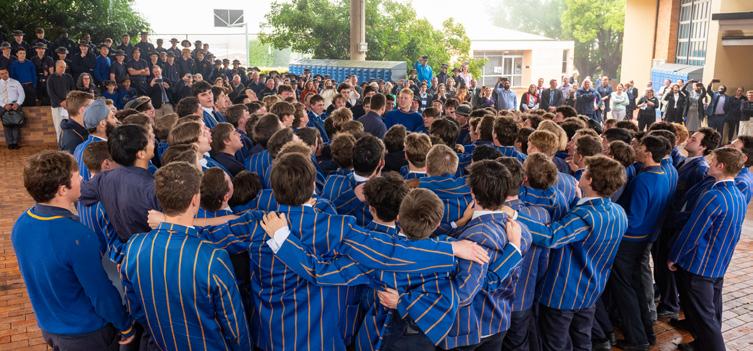
It is a parents’ job to raise their children to be independent and to leave home, but it is important that we don’t forget where we came from and who was there to support us, no matter what.
Once you’re off and experiencing the new, exciting world of “life after school”, try not to forget the importance of family. Keep your parents involved in your life. A meaningful conversation every now and then will work wonders.
Best of luck on the journey that lies ahead.
Dr Ian Waite is responsible for the mammoth task of creating our boys’ timetables each year.

It’s a mind-boggling task when you consider the number of students, the number of lessons, the number of teachers and the number of rooms. How can all this be considered and clashes avoided? Well, it is possible, and Dr Ian Waite, Data Analysist is the man for the job! He kindly took some time out of his very busy schedule getting 2023 ready, to share the process of creating a timetable.
The Senior School timetable is incredibly complex and, as a result, the process commences early in Term 3 after subject selection for students heading into Years 9 and 11 the following year. Year 8 boys have the choice of 22 different subjects, although English, Mathematics, Science, History and Physical Education are mandatory. Students are asked to select an additional three subjects, plus two reserves, making up their eight subjects for Years 9 and 10. Every boy’s subject selection is monitored by his Head of House and the respective Head of Department to gauge the suitability of their choices. Once this vetting process has concluded, we construct the timetable itself. Initially, we use their requests to arrive at “lines” so that we can timetable the School.
An example of one of these lines could include: Business Studies, Design, Digital Technologies, Drama, Geography and Workshop Practices. A student who has selected Business Studies will be allocated to that class in that line of possible classes. In the past several years, we have been able to accommodate over 98% of “first” requests for Year 9 students without the need to offer their reserve subject. Indeed, some years we have had a 100% success rate; an extraordinary achievement considering there are 50 unique subject combinations in our current Year 9 cohort of 147 students, with only 22 of them taking the most common course of study.
The situation is even more complex when boys are entering Year 11. The Year 10 students are offered 36 different subjects. They must select either General English or Essential English, and either Essential Mathematics, General Mathematics or Mathematical Methods but their remaining four subjects can be from a range of choices offered here at School, or at TAFE catering for their own abilities, interests, and future pathways. The number of combinations increases dramatically at this point. Of our current 151 Year 12 students, there are 115 students undertaking a unique course of study, such as TAFE or an apprenticeship, while the most common course of study has a maximum of only six students!
After we factor in additional subjects such as their pastoral care group, there are no two students who would be in the same classroom through the full two-week cycle of 60 periods per cycle. The downside is that infrequently we must ask a student to take one of his reserve subjects to be able to timetable the School. Normally this impacts fewer than ten students; however, like Year 9s, we also have a 100% success rate in some years! The point is, that we treat every year differently, starting from scratch for our Years 8 and 10 cohorts.
Once we have established the subjects that the students are allocated, and the class that they are allocated to, then the real work commences... allocating over 1000 classes for six year levels into six
periods per day over the two-week cycle (Week A and Week B). For each period we need to balance each individual boy’s subject, the teacher of his class, and the room that this class may be allocated. Having a finite number of rooms and teaching staff can also be challenging as there are some periods where our general classroom usage and teacher availability is over 95%.
For some subjects, such as the English or History classes, this is quite easy to accommodate as rooms do not need to be specialised.
However, for some subjects that require specialist facilities, such as the Industrial Design and Technology subjects, this can be quite challenging. An added challenge is that we arrange access for outside providers to assist with the delivery of some of the course work, such as our Certificate III in Agriculture and our Diploma of Business.
Across the School, we need to allocate 150 different subjects, across 50 periods in the two-week cycle, utilising almost 80 teachers, adding up to over 1000 classes while incorporating 39 meetings involving a total of 126 teachers. It is like a gigantic, three-dimensional, or indeed four-dimensional, jig-saw puzzle that needs to be solved to allow us to deliver the wide range of courses to the boys of Toowoomba Grammar School.
By Dr Ian Waite, Data AnalystThis is the result and what the “Master Timetable” looks like. Each coloured square can be either a single class, such as 7F English (the grey “A” for Monday Week A, period 1) or a line of many classes, such as Year 12 “W” that contains 12 different Year 12 classes for that period (e.g. Monday Week A, period 1)
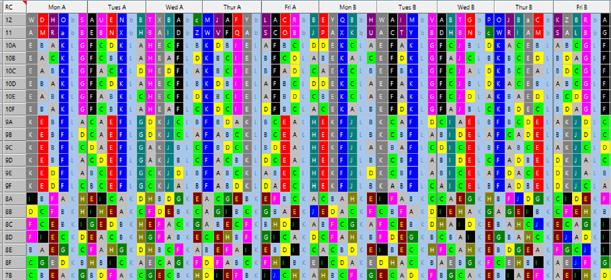 Fun Fact: 37.5% off all TGS students in Years 7 to 12 have a unique course plan while almost 54% of our boys in Years 9 to 12 have a unique course plan.
Fun Fact: 37.5% off all TGS students in Years 7 to 12 have a unique course plan while almost 54% of our boys in Years 9 to 12 have a unique course plan.
Coinciding with the Grammar Downlands weekend on 5-7 August we hosted reunions for Old Boys, most specifically from cohorts in multiples of 10 years. This year we featured reunion events for boys who were in Year 12 or would have finished in Year 12 in 2012, 2002, 1992, 1982, 1972,1962, 1952, and 1942.
It was a most successful weekend with over 300 attending the various functions and many more catching up at the numerous informal events that occurred across the weekend. Coordinators for these Year Level Groups and, most specifically School staff, are sincerely thanked for their work in ensuring the success of this weekend.
In terms of organisation, we are still confronted with the challenge of providing a format that caters for all Old Boys who attend the weekend events. It is evident that our younger reunion groups look to just enjoy time together to catch up and are not in need of formality. Our more senior reunion groups seek some formality. Tinkering of format will continue for future years.
Congratulations to the organisers of this years’ OBA Sunshine Coast gathering which was also attended by
the Headmaster, Dr John Kinniburgh. Hosted on 22 October at the Duporth Tavern’s “Lane Way Room”, all in attendance had a most enjoyable lunch and afternoon.
Our efforts to provide an opportunity for Old Boys to gather and catch up at home rugby games have been most successful with up to 30 Old Boys gathering at each of the occasions hosted this rugby season. The specially designated gathering and viewing area on The Promenade has provided a reason and focus for some of our Old Boys to make the visit and return to the School.

Some most positive feedback was received, illustrating that Old Boys returning are at ease with having an area where they can gather and meet up with others of the same or different vintages. Old Boy Matthew Jenkin (8082) travelled from Gladstone, picking up his Scarborough-residing father, Ronald Jenkin (50-51), travelling to Toowoomba for the opportunity for them both to make a visit and share
memories of each other’s time at the School.
Given the success of this initiative, it will continue in 2023. Discussions have commenced with the School regarding the redevelopment of this area which will not only provide a unique gathering place for Old Boys but will be a most handy facility for parents and boys during the week.
The OBA has been hosting information evenings intended to inform Old Boys of the business and operations of our Association. We will be undertaking further information evenings, and I extend an invitation to Old Boys to join with us for this informal opportunity, where you can meet current members of our Management Committee and the Headmaster and hear about what we do and the strong working relationship we have with the School. Refreshments and finger food will be available.
Interest and willingness from Old Boys to be involved in the work of our Association is encouraged and we would love to hear from you. Please contact me on 0409 010 595 or email on thecreedons@bigpond.com.au.
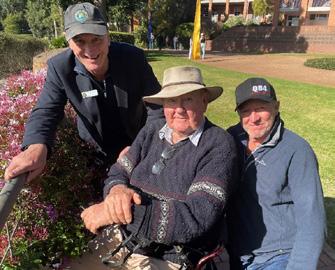
Another six months have passed and much has happened and is happening for our Association.

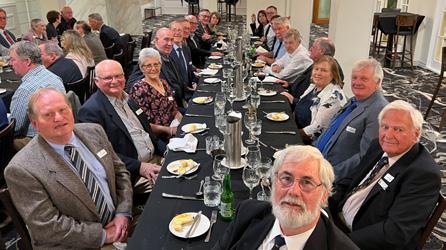

A highlight on our OBA calendar is the Year 12 Final Assembly.
On the last day of their TGS enrolment, Year 12 students participate in a Final Assembly. A significant part of this Assembly is our Association’s welcome to these boys to the rank of Old Boy and our presentation to them of the TGSOBA tie, cap and key ring.
Our practice is to have Old Boys, who are fathers of Year 12 boys, present their sons with these ties, caps and key rings. There is no prouder moment than for an Old Boy father to welcome his son to the ranks of the Toowoomba Grammar School Old Boys’ Association.

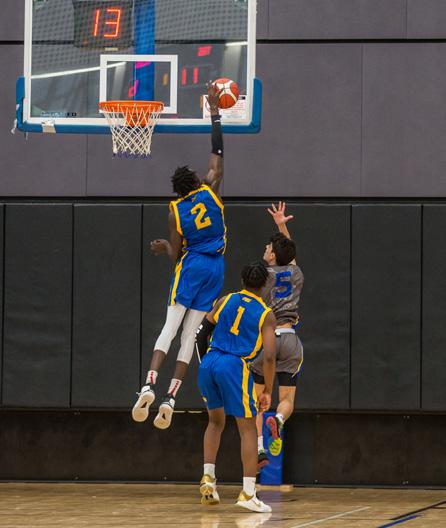
It needs to be savoured and celebrated as it doesn’t happen very often: a GPS Premiership.
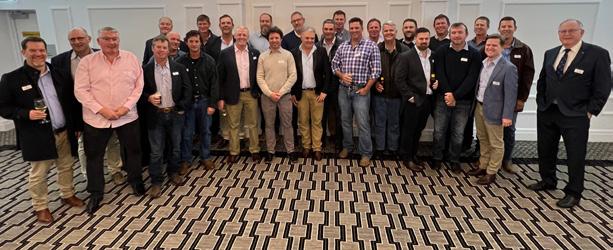
Every Toowoomba Grammar Old Boy joins with me in sharing our delight at the achievement of the 2022 1st V Basketball side. What an amazing result for the players, coaches, and program.


It is our proud tradition to present players with a Premiership Cap as a memento of their significant achievement and as recognition from all Old Boys of the significant pride we have in their achievements. A presentation of these Premiership Caps was made at a suitably hosted School Assembly.
As an Association we take the opportunity to wish everyone all the best for a fun and festive summer vacation.
(1973-77) President MarkI am most keen to talk to you about our Association and how you can become involved.
Many of us dream of that lucky break that will change the course of our life...
Waverley Stanley’s lucky break came when he was in Year 7 in 1979.
His teacher, Mrs Rosemary Bishop, saw his potential. She believed this young indigenous boy from Murgon had something special to offer the world and she fought to put him on the path to greatness.
“I was the only aboriginal boy at TGS at that time (1980-84), so I was culturally isolated, but I didn’t realise it at the time and it didn’t matter to me because I had so many friends and I felt supported by everyone there.”
“There was no discrimination towards me at all and looking back I think that was because of the values taught at the School, like showing respect for others and their differences. Most boys didn’t even realise I was indigenous; to them I was just Stan. We were all brothers, we looked after each other, we understood what we were going through being away from family and made the most of what we had.”
studying at universities, working or undertaking further training.
A very humble and passionate man, Waverley does not like to take credit for what he has achieved or is giving to others.
“I am so grateful for the life I’ve been given because of TGS, and I love that we can collaboratively make a difference for children.”
“If it wasn’t for Rosemary Bishop and Headmaster Dent, I wouldn’t be the man I am now; they changed my life and gave me a different pathway. I don’t like to think where I would be otherwise, I stay in the moment and am grateful for what I do now.”
Mrs Bishop contacted the then Headmaster of Toowoomba Grammar School, Mr William Dent, and asked if Waverley could be accepted into Toowoomba Grammar School on a scholarship. Mr Dent agreed and so changed the course of Waverley’s life.


“I don’t like to think about where I would be now if that hadn’t happened,” stated Waverley.
He enthusiastically seized the moment and proved Mrs Bishop and Mr Dent right for believing in him, developing into a passionate man, dedicated to giving other indigenous youth the opportunities he was so grateful to receive.
“The School accepted me for who I was, not the colour of my skin, or my background,” said Waverley.
Not only did Mrs Bishop’s act of faith and kindness change Waverley’s life, but the lives of hundreds of others since then as well. Waverley is proud to have been the first indigenous Prefect at TGS and has worked tirelessly to give indigenous youth the exact same opportunity afforded him, by creating the Yalari Foundation and the Rosemary Bishop Indigenous Scholarships in 2005. Yalari is a not-for-profit organisation that offers quality, secondary education scholarships at leading Australian boarding schools for Indigenous children from regional, rural, and remote communities. Toowoomba Grammar School and The Glennie School were the foundation schools with three Yalari students in 2006. Now, up to 50 Yalari scholarships are granted Australiawide each year. This year, there were over 250 students on Yalari scholarships nationally with an alumni group of 380
Waverley was thrilled to learn that TGS appointed an Indigenous Education Coordinator, Mr Scott Gale, earlier this year. He believes it will add an important cultural overlay to the School and help future generations to acknowledge, accept and value diversity; to judge someone not for their cultural upbringing, but for who they are as a person.
“It takes a whole school community like TGS to help and educate our children, but the real change will come when they are parents. That’s when we can change generational thinking,” said Waverley.
“That is my mantra – generational change – our past has brought us to the present and what we do in the present will determine our future. I think we have a great future ahead.”
Waverley Stanley OAM, Michael O’Keeffe, Ian Hogarth, Mr Col Thorburn - 1984Matthew Igo Ball’s (2001-08) desire to help those less fortunate was sparked during his time at Toowoomba Grammar School.
“We volunteered at the Toowoomba Hospice, so that’s where my passion for giving back to the community started,” said Matthew.
“I just continued on after that; I always wanted to help out in different ways, such as President of the USQ PNG Students’ Association, Daffodil Day and youth mentoring.”
When COVID struck in 2020, Matthew was stood down from his position as a customer service manager in the aviation industry and took the opportunity to throw himself into community service. He decided to focus on Papua New Guinea due to his heritage and strong family connections there and discovered Project Yumi through a Seek Volunteer ad.
Project Yumi takes new and used educational and medical equipment from around Australia and distributes it to remote schools, health centres and hospitals across PNG. The charity is 100% volunteer-based and makes a tangible difference at the grassroots level in PNG.
“It’s a massive project and has a huge impact on lives in PNG, particularly for those in remote areas, where they don’t have much government support,” stated Matthew.
Many schools in Papua New Guinea are heavily under-resourced. Children in rural areas sit on hard, dusty floors all day because they do not have any desks or chairs in their classrooms. Literacy rates are low due to limited or zero access to books and other essential learning equipment, such as pencils. Without these tools, basic educational opportunities are restricted, and the cycle of poverty continues.
The medical resources that Project Yumi supplies range from birthing kits to hygiene packs along with wheelchairs, crutches, and basic needs such as sterile pads and bandages. This encourages people to come to health
centres to seek proper treatment and therefore reduces the risk of illness and death.
“Project Yumi provides these materials that most Australians take for granted. Having access to these simple resources makes a huge difference to residents there,” said Matthew.
“Providing tangible resources gives the residents the best opportunity to excel in the future. It helps families and villages and is a rewarding project for everyone involved.”
The charity was coincidentally founded by former Toowoomba local Renee Mero, which provided Matthew with another connection. He spent eight months as a volunteer coordinator, and the organisation experienced huge growth because of his various initiatives.
“It’s been an amazing experience. It’s definitely a labour of love. It’s 100% volunteer-based, so everyone is fuelled by their passion for making things better,” Matthew remarked.
Despite returning to his full-time position in aviation in October 2020, Matthew couldn’t let go of his commitment to Project Yumi and continued volunteering in his spare time. He was elected President of the Board in August 2021 and now oversees strategy, structure, corporate governance and liaising with suppliers and sponsors. But he also still works on the frontline, collecting and packing supplies.
“Recently, we packed a 40-foot container with over 1200 educational resources for 13 schools across the Morobe and Madang provinces,” stated Matthew proudly.
“For me personally, it is a great opportunity to give back to my motherland.”
Due to COVID restrictions, Matthew hasn’t had the opportunity yet to be in PNG when the deliveries arrive, but
he hopes to experience that joy in the next few months.
Project Yumi has 200 volunteers across Australia, most of them based in South East Queensland, and many are Old Boys from various GPS schools. The charity has a further 240 volunteers in PNG to assist with the distribution of goods.

So far, the project has saved more than one million resources from landfills, impacted over 25,000 lives, and contributed to 13 provinces in PNG.
Matthew believes that there’s no better feeling than giving, knowing that you won’t get anything in return. Whether it’s volunteering time or making financial or in-kind donations, he has seen first-hand the difference that it makes to those less fortunate.
“I was blessed to have so many opportunities as I was growing up and hopefully by giving back, we are able to inspire and provide the same opportunities for the future doctors, teachers and leaders of PNG,” said Matthew.
“You never know when you’ll need help yourself. What you give, you get back.”
You can learn more about Project Yumi at www.projectyumi.org, or email info@projectyumi.com
We are always looking for articles to publish about our Old Boys. For more information please email communications@twgs.qld.edu.au
Hamish Stewart (2004-15), Harry Hoopert (2013-15) and Matt Faessler (2015-16) were selected in the Australia A Squad for the Pacific Nations Cup that was held in Fiji in July.
Isaac Cooper (2019-20) has been added to the International Sportsmen Honour Board in Old Hall following his inclusion in the Australian Swim Team at the Tokyo Olympics in 2021.

During World War II, Arthur Lamb (1902-03, TGS Dux 1903) actively promoted fundraising for the war effort at TGS. This calico banner, which is in mint condition, was used in his promotions. Arthur’s son, Colin (1941-44) recently found the sign and donated it to the School Museum.
Colin is pictured here with the sign and his TGS Old Boy sons, Dr John Lamb (1968-72) and Ian (1975-79)

Earl accepted a Special Scholarship to the National University at Canberra where he undertook a Science honours degree, majoring in Mathematics. In addition to being TGS Dux, Earl was a Prefect, a Cadet Under-Officer, President of the School Public Speaking and Debating Group and keen member of the TGS Dramatic Society. He held TGS in high esteem and credited it with inspiring in him a lifelong love of mathematics. Prior to his passing, he resolved to make a donation to the School in recognition of its impact on his life. The School is extremely grateful to Earl and his family for this generosity and his acknowledgement of the wonderful impact that TGS had on his life.
Sean Johnston (2014-18) played Link Larkin alongside a star-studded cast in the 2022 production of Hairspray at Melbourne’s Regent Theatre. Sean has enjoyed roles in various productions since graduating from the Queensland Conservatorium Griffith University, including playing Danny in Grease at QPAC and in Jersey Boys at The Star, Gold Coast but this is his biggest role to date.
Bryson Head (2010-12) won the seat of Callide for the LNP in the June 2022 by-election. Interestingly, Bryson replaced another TGS Old Boy.
Dean Dudley (1964-68) returned to TGS in July for a special morning tea in honour of his brother, Earl (196265) who passed away in August 2021. Dr Earl Dudley kindly left a bequest to TGS on his passing. Earl was TGS Dux in 1965 and received the Sir Littleton Groom Memorial Prize for Best Senior Pass. He was ranked ninth in Queensland in the Senior Exam and won an Open Scholarship, along with the Hunt and Smart Bursary for Best Senior Pass in Toowoomba.
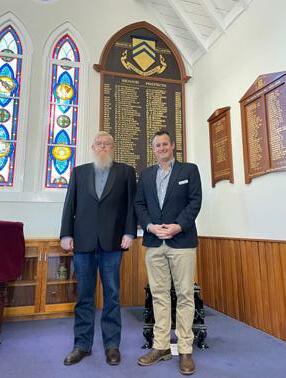
Sam Reddan (2014-17) was awarded TAFE Queensland Plumbing Apprentice of the Year (4th year) in August. Sam finished his apprenticeship last year, completing his Cert III in plumbing and gas, and has one unit to go on his Cert IV in plumbing and gas. He is working as a Network Technician with APA Gas and he hopes to start a Cert IV in pressure control early next year.
 Colin Boyce (1975-79) who is now the Federal Member for Flynn. Bryson is currently the youngest member of Queensland Parliament.
Colin, Dr John and Ian Lamb
Dean Dudley and Headmaster, Dr John C. Kinniburgh
Colin Boyce (1975-79) who is now the Federal Member for Flynn. Bryson is currently the youngest member of Queensland Parliament.
Colin, Dr John and Ian Lamb
Dean Dudley and Headmaster, Dr John C. Kinniburgh
Professor Craig Baillie (1989-90) has made history after becoming the first Head of School and Dean for Agriculture and Environmental Science at the University of Southern Queensland.
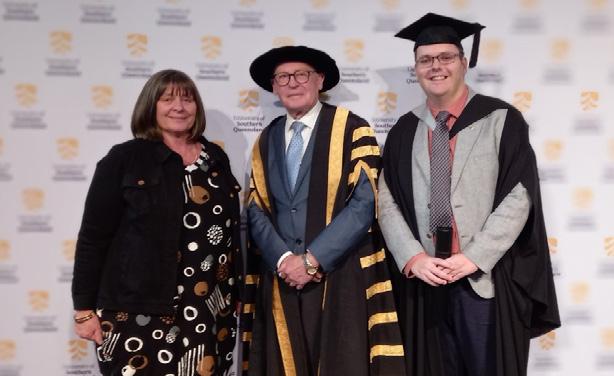

Neil McPherson (1958-59) and his wife, Lynn, were invited by the Governor, Her Excellency the Honourable Dr Jeannette Young PSM and the Chief Justice of Queensland, Helen Bowskill QC, to attend functions celebrating the 100th anniversary of the Society of Notaries in Queensland in August. Neil was appointed as a Notary Public 42 years ago and has twice been the President of the Society of Notaries. Neil has now been a Solicitor for 55 years. He is on the roll of Solicitors for Queensland, New South Wales and the High Court of Australia.
Dr Davin Lim (1984-88) is now regarded as one of the world’s leading experts for laser-treated skin disorders and rejuvenation therapies that include tattoo removal, scar revision and laser resurfacing. He has been published in numerous international journals and presented at international conferences and has a seat on various advisory boards including those of Galderma, Fraxel and Syneron Candella and plays an advisory role at La Roche Posay and Allergen. He is an Australian Board-Certified Procedural and Aesthetic Dermatologist and a member of the American Academy of Aesthetic Medicine. In 2003 he was awarded the Royal Society of Medicine Registrar’s Prize in the UK.
Matt Denny (2011-13) has celebrated the best performance of his career, winning gold in the Discus at the Commonwealth Games in August after beating his rivals in all of his six throws and setting two new PBs including a career best throw of 67.26m.

Jake Dingle (2007-09) was named Queensland male Champion of Champion Axeman following the popular woodchopping events at the Brisbane EKKA in August.
Jai Gordon (2019-20) represented Australia in the World Athletics Under 20 Championships in Columbia in August. He was also selected as a member of the men’s 4x100m relay squad for the 2022 Commonwealth Games but skipped that event as it coincided with the World Championships. He won the U20 Men 100m at the Australian Track and Field Championships in March with a time of 10.28sec. Jai’s aiming for the 2024 Paris Olympics.
Guy L’Estrange (1982-86) recently visited TGS while on holidays in Toowoomba from his home in Canada. He ran into Headmaster, Dr John Kinniburgh and his dog, Cookie, out for a walk and shared some stories of his days at TGS with him.
 Mrs Sheridan McNamara, Mr John Dornbusch, USQ Chancellor and Mr Thomas McNamara, BBus USQ
(L-R) Margot de Groot AM (President), Neil McPherson (Past President and Council Member), James Madden (Secretary) and Kara Thomson (President of the Queensland Law Society)
Guy L’Estrange with Headmaster, Dr. John C. Kinniburgh
Matt Denny at the 2022 Commonwealth Games
Mrs Sheridan McNamara, Mr John Dornbusch, USQ Chancellor and Mr Thomas McNamara, BBus USQ
(L-R) Margot de Groot AM (President), Neil McPherson (Past President and Council Member), James Madden (Secretary) and Kara Thomson (President of the Queensland Law Society)
Guy L’Estrange with Headmaster, Dr. John C. Kinniburgh
Matt Denny at the 2022 Commonwealth Games
Ernest MOFFATT (1941-42) date of death unknown
Harold BENNETT (1941-42) date of death unknown

Ronald MOLLER (1945-46) in November 2015
Colin SMITH (1954-55) in April 2019
Owen Stanley PULFORD (1957) in August 2019
Dudley VENABLES (1954-55) in June 2020
Ian SMITH (1960-63) in August 2020
Milton HOLMES (1953-54) in November 2020
John KLOSE (1951-54) in February 2021
Kenneth DREWE (1936-39) in March 2021
Dorothy JORDAN (TGS Ancillary Staff 1976-2002) in September 2021
Gregory MICKELBOROUGH (1965-66) in November 2021
Malcolm MURDOCH (1942-43) in November 2021
James PINKERTON (1943) in December 2021
John Kenneth PROVAN (1953-57) in December 2021
Tony LEONG (1964-66) in April 2022
Quintin KOWITZ (1938) in May 2022
Spencer ANDREWS (1945-48) in May 2022
Denis LINCOLN (1954-56) in May 2022
John “Len” RIGG (1950) in May 2022
James “Jim” CASSIMATIS (1952) in June 2022
John SHILLIDAY (TGS teacher 1960-64) in June 2022
Kenneth RUB (1937) in June 2022
Ross ARNOLD (1948-49) in June 2022
Jacob HARRIS (2005-09) in July 2022
Godfrey TINDALL (1944) in July 2022
Allan COOPER (1945-46) in July 2022
John BOADLE (1944-47) in July 2022
Joshua OZEGOVIC (2017-18) in August 2022
Graham BURSTOW OAM (1940-43) in August 2022
Tom GREY (2004-08) in September 2022
John CALLAGHAN (1950-51) in September 2022
Reginald BRADY (1942) in September 2022
Robert “Bob” JOHNSON (1953-56) in September 2022
Alan LEATCH (1946-49) in September 2022
Evan STOREY (1976-80) in October 2022
James “Jim” SIM (1949-52) in October 2022
Samuel BELFORD (2009-2013)
to Kalina Bennett in June 2022
Peter FIRTH (2002-05)
to Shontelle Williams in July 2022
We offer our sincerest apologies to the family of John Klose for the incorrect spelling of Klose in the last edition of Balliwanga.
Dr Earl Dudley credited TGS with inspiring in him a lifelong love of mathematics and held the School in high regard. So much so, he kindly bequested a donation to the School in recognition of the positive impact it had on his life. His brother, Dean, kindly attended TGS in Earl’s honour to ‘officiate’ the generous donation.
Earl had been the Australian Fulbright Alumni Association’s Public Officer since 2012 and contributed actively to the AFAA, including as treasurer and public officer. He was awarded a 1970 Travel Scholarship to undertake doctoral studies in mathematics at the University of Washington in Seattle. Following this, Earl pursued a career in academia and the Australian Public Service. He passed away in August 2021 following a long illness.

Dorothy Jordan was a loyal and valued member of TGS ancillary staff from 1976-2002. Dorothy was employed in various housekeeping roles within the boarding houses before leaving that role to assist in the kitchen before suddenly and unexpectedly deciding to retire as she drove to work one day in March 2002.
Dorothy was considered a great character, generous in nature with a wicked sense of humour, renowned for her ‘power naps’ and her great memory for past students. Even after she retired, Dorothy was always very interested in the School, particularly the boarders. She passed away in September 2021.
Written by TGS House Manager and friend,Morag Watt
John Shilliday arrived at TGS in 1960 as a teacher of History and English, a Rugby and Athletics coach and Rugby referee. He was an excellent teacher, respected and held in the highest regard by his students, always approachable and made learning enjoyable. John was a Resident Master who lived with his family in the flat under East dorm. Many would recall baby-sitting his daughter, Jenny, and his wife producing the most delicious food. Mr Shilliday’s illustrious teaching career continued at other prestigious schools until his retirement in 2003. Mr Shilliday passed away in June 2022, aged 89.
Information supplied by Mick Storrs (TGS Old Boy 1959-62)

Miss Jo-Anne Thibault started teaching Year 3 at TGS in 2003 before taking on the School’s first Prep students in 2004. Jo was loved and respected by staff, families, and students alike, remembered as a dedicated teacher and a wonderful friend. She had a flair for making the classroom a happy and creative learning environment.
She passed away peacefully at her home on Saturday, 19 February 2022, leaving behind her devoted husband, Neil Donaldson (passed away 25 April 2022 after a two-year battle with cancer) and their daughter, Georgia.
If you would like to express your gratitude to Jo, please make a donation in her name to the Olive McMahon Lodge via QLD Cancer Council – a dedicated cause extremely close to Jo’s heart.
Information supplied by Maddison Payne, Toowoomba Grammar Junior School Teacher Aide https://donate.cancerqld.org.au/s/111/104
Term 2
Clifton
Friday, 17 February
Clifton Show
Pittsworth
Friday, 10 March
Pittsworth Show
Inverell
Friday, 10 to Saturday, 11 March
Darwin
Wednesday, 15 to Friday, 17 March
NT Cattlemen’s Association Conference
Moree
Thursday, 16 to Friday, 17 March
Goondiwindi
Friday, 17 March
Goondiwindi Junior Rugby Golf Day
Toowoomba
Term 1 Term 3
Thursday, 30 March to Saturday, 1 April Toowoomba Show
Goondiwindi
Saturday, 22 April
Goondiwindi Junior Rugby Carnival
Goondiwindi
Friday, 28 to Saturday, 29 April Goondiwindi Show
Taroom
Tuesday, 2 May Taroom Show
Crows Nest
Saturday, 13 May Crows Nest Show
Dulacca
Saturday, 27 May
Julia Creek
Tuesday, 6 to Wednesday, 7 June ICPA Qld Conference
Toowoomba
Tuesday, 6 to Thursday, 8 June FarmFest
Roma
Friday, 16 to Saturday, 17 June Boarding School Expo
Narrabri
Friday, 21 to Saturday, 22 July Boarding School Expo
Longreach
Friday, 28 to Sunday, 30 July
Kingaroy & Mundubbera
Wednesday, 2 to Friday, 4 August
Meandarra
Friday, 11 to Saturday, 12 August
Brisbane
Saturday, 12 to Sunday, 20 August Brisbane Ekka
Gunnedah
Tuesday, 22 to Thursday, 24 August
AgQuip Dalby
Wednesday, 30 to Thursday, 31 August
Emerald
Thursday, 22 to Saturday, 24 June AgGrow
Term 4
Tenterfield Friday, 6 to Saturday, 7 October
Toowoomba Grammar School will be on tour again during 2023
During 2023 TGS will be on tour, visiting past and present families, catching up with Old Boys and meeting new families. These events are a wonderful opportunity to meet our staff and hear more about what is happening at TGS.
More details regarding events and venues will be available soon. For further information and to RSVP, please register via the QR Code or link below.
twgs.qld.edu.au
Community » Events » TGS On Tour